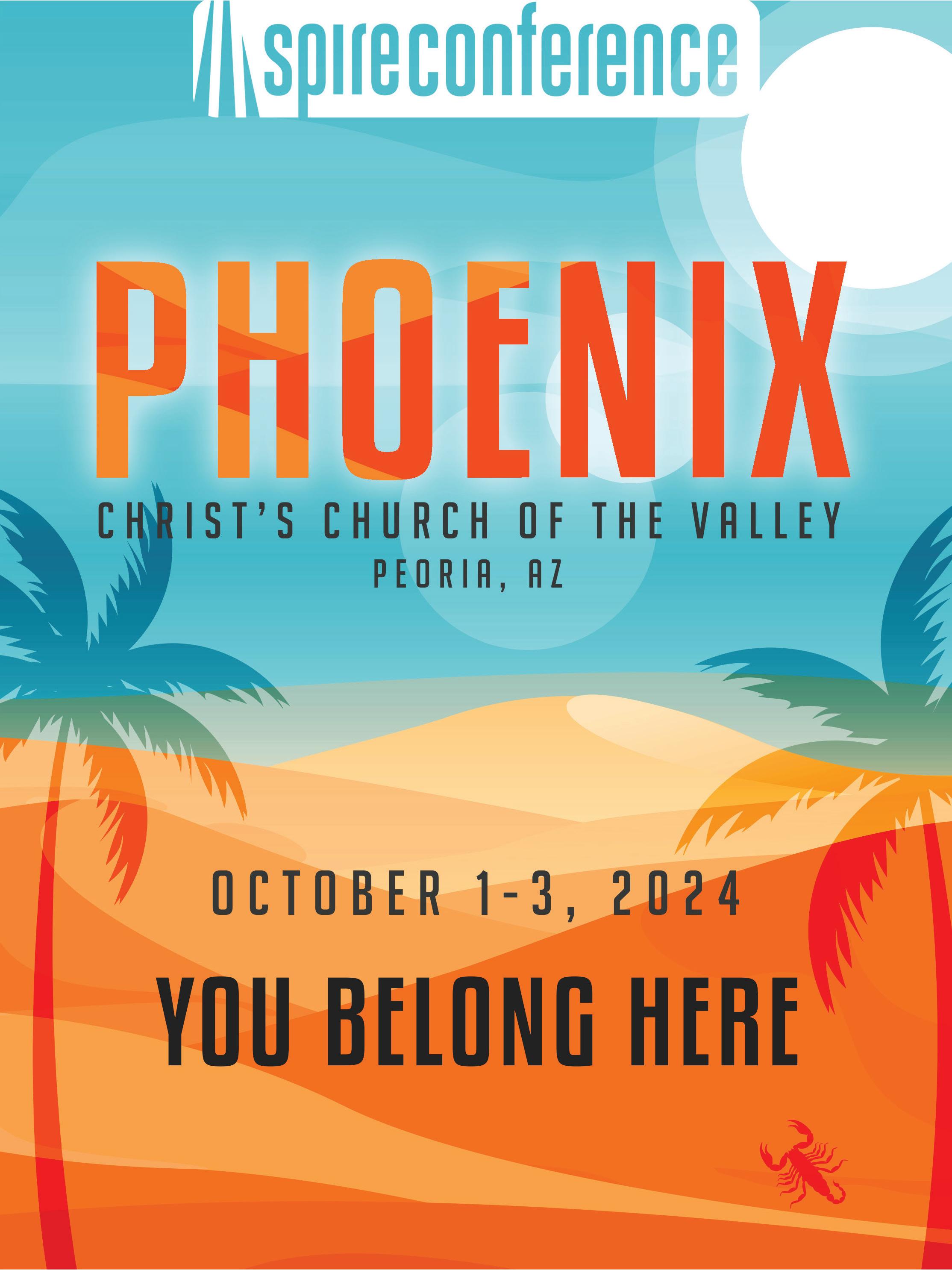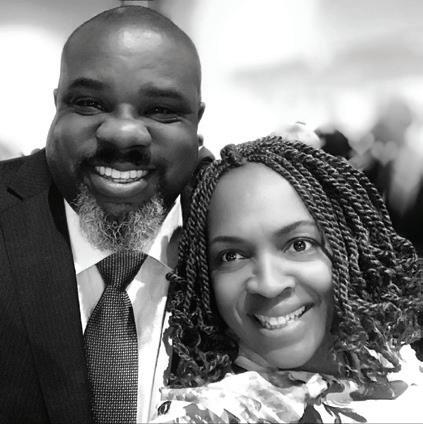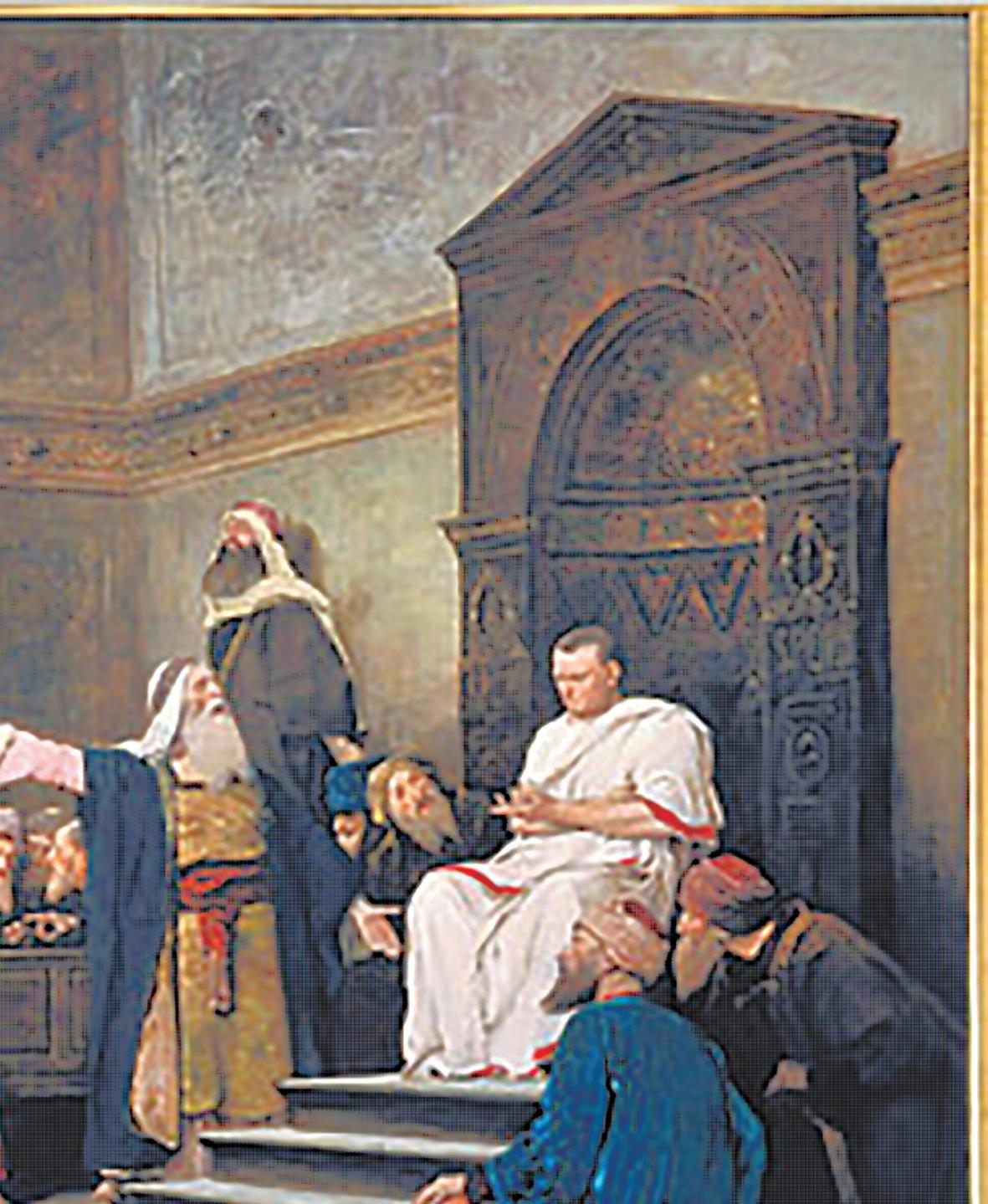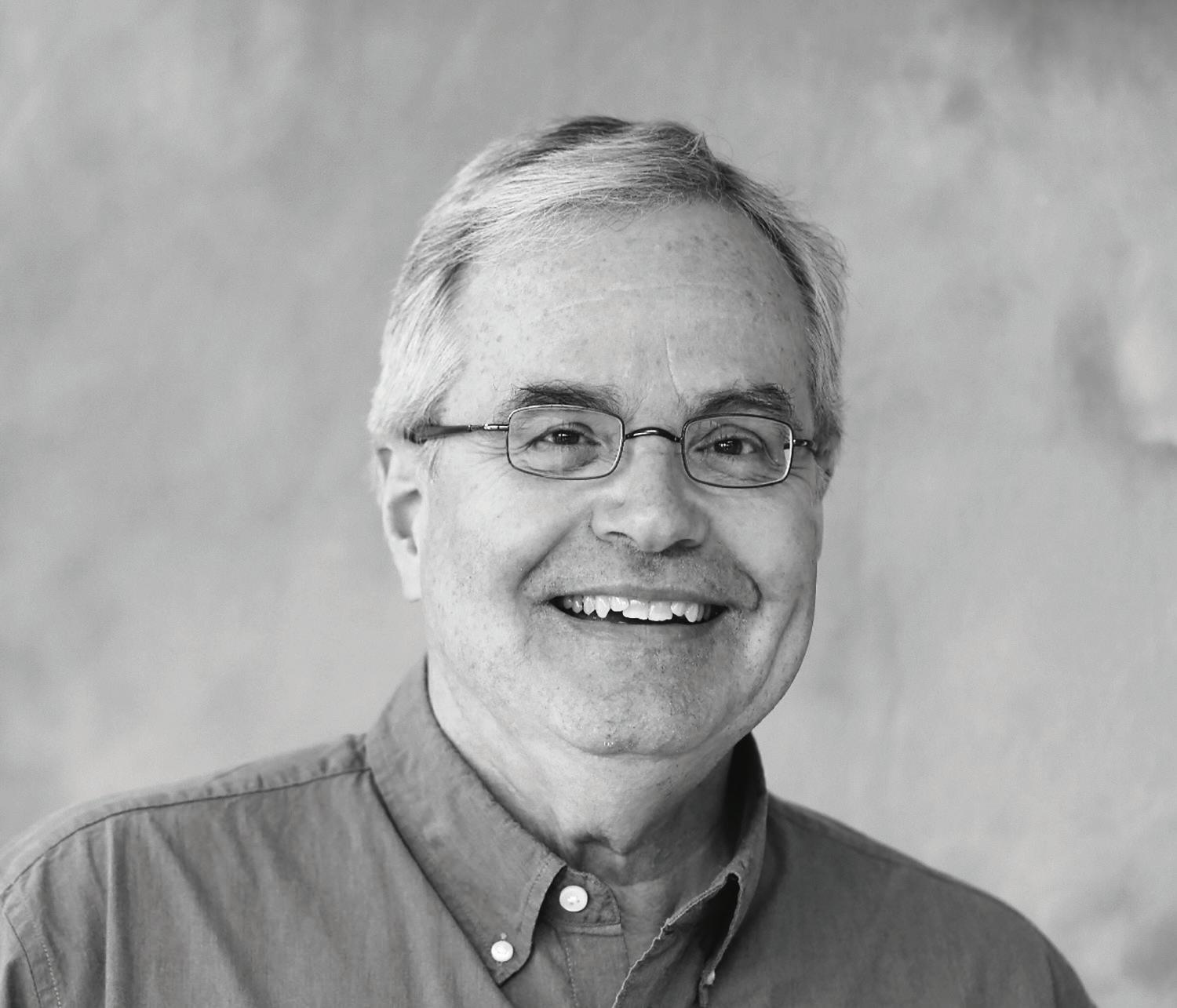







NationsUniversity ®




Let NationsUniversity be your leadership training solution for church leaders, ministers, and missionaries.
Certificates, Undergraduate & Graduate Programs










M










NationsUniversity ®




Let NationsUniversity be your leadership training solution for church leaders, ministers, and missionaries.
Certificates, Undergraduate & Graduate Programs










M

any of my friends and colleagues are in the same season of life that I am journeying through. The word that describes it is being thrown around quite a lot as the tail end of the baby-boomer generation in ministry navigates it with their local leaders. The word is transitioning. For many, it strikes fear into the heart for all that is unknown and unpredictable that lies before them.
In a recent podcast, a friend of mine shared his thoughts about transitioning from the church he and his family led and served for more than 30 years. He said that for years, he looked through the lens of being the senior minister of that church, but now he was coming to grips with simply being a child of God.
That little phrase hit me like a freight train because it revealed something beneath all of the methodology of transitioning. It was a deeper question that put its roots down into my identity, particularly my identity in Christ.
My story is a common one. I was a Christian brought up in a Christian home. My spiritual walk could be best described as nominal. But when I experienced God’s call on my life, I let go of the secular path I was on to dedicate myself to following him in fulltime ministry. My life was reshaped around that decision. It affected who I married, how we chose to raise our children, where we lived, how we used our time, the friends we had, how much income we made . . . everything!
We discovered that our gifts were suited to both serve and lead in ministry and the fit felt perfect. So, from that time until today, that is how I understood my identity in Christ. It came from leading and growing the church, loving and ministering to her people, forsaking the things of this world, and filling up the kingdom as God’s lost children were finding their way home. We’ve done that for nearly 45 years, and now the word transition has become real for us.
We approached it like we’ve tried to approach everything in ministry, with a method that honors God while inspiring and protecting people. We trusted that God had always provided a plan for our lives and would continue to provide direction. The elements of transition in our context worked out very well. We had a great successor, the leadership of the church unified around him, the congregation felt and continues to feel comfortable, all the church metrics were up and to the right, and the church went out of their way to honor us and our family. It felt perfect!
However, as God worked to peel back the layers of our hearts, he helped us discover something more profound communicated through the words of my friend who was just trying to be a child of God. Those words haunted me and I was forced to ask myself if I really knew what it meant to be a child of God. “Who am I?” as Matt Redman wrote in The Heart of Worship
When the music fades All is stripped away And I simply come Longing just to bring Something that’s of worth That will bless Your heart.
What is a child of God? I certainly identified myself this way, but I defined it through my service and leadership in the church. But what happens when the titles are transferred? What happens when the gift set has no place to be plugged in? How can I be a child of God without the things that I’ve used to define me as one?
My wife and I began exploring it together. The phrase “child of God” is deeply profound and it defines who I am, who God is to me, and the nature of our relationship. First, the phrase leaves no space for me to be proud of myself or to feel that I’ve earned or deserve anything. I am simply “a child,” which means the expectations are and have always been low! Second, it
means that I have been undeservedly blessed by having the best Father! He is all of the things Paul defines in I Corinthians 13 about love—and he’s all of that to me! The nature of our relationship was birthed through the blood of Christ. So this is where it begins; this is the bedrock of my identity.
In my case, he has given me ways to imitate him as a father, a son, and a brother. My wife and I explored how we were reflecting our relationship to God as parents, as loving and honoring children, and as siblings. In ministry, these God-given relationships are often placed on the back burner. It is a great time to evaluate not only what you have done in ministry, but also what ministry has done to you
Next, since transition takes many things out of your hands, it’s time to ask, as God asked Moses, “What is that in your hand?” Discover what remains that God has not released you from. Be the best steward of what you have before looking for new things to fill your hands.
Finally, as you have always done, look at where God is working and join him there. Proximity is more important than production and if God is truly there, production will come.
I am re-becoming a child of God. It’s a hard thing, but it’s truly a good thing!
@_jerryharris /jerrydharris



Conflict is as old as human history.
Adam and Eve found themselves in conflict with their Creator in the Garden of Eden. Cain engaged in conflict with his brother, Abel, which resulted in murder. The children of Israel rebelled against Moses and Aaron in the desert. Old Testament kings clashed with Old Testament prophets. Jesus sparred with teachers of the law. Roman authorities and Jewish religious leaders persecuted the early church.
Even the early church, as it found its way in the world, encountered conflict. The Greek speaking disciples accused the Hebrew speaking disciples of discrimination in the distribution of food to needy widows (Acts 6). Later, Paul and Barnabas, two faithful missionaries, disagreed so strongly about John Mark’s role in their ministry that they parted ways (Acts 15).
We’re not strangers to conflict today, either. Look around you. Nations go to war against other nations.
Political parties rage against one another. Churches split. Families fall apart. People war against their own souls.
Faced with the inevitability of conflict, how should Christians conduct themselves? What are our rules of engagement? With Scripture as our frame of reference, here are some, but certainly not all, of the rules.
Choose your battles wisely.
Sometimes conflict catches us off guard. On other occasions we choose it. Paul cautioned Timothy, “Again I say, don’t get involved in foolish, ignorant arguments that only start fights. A servant of the Lord must not quarrel but must be kind to everyone, be able to teach, and be patient with difficult people” (2 Timothy 2:2324, New Living Translation). The simple principle here is to avoid unnecessary arguments. We don’t have to be proven right. We don’t have to have the last word. Sometimes it’s best to walk away; to refuse to engage.
Don’t take the bait.
When people find themselves in conflict with someone, often their initial response, wittingly or unwittingly, is to degrade their opponent. It’s easy to take the bait. But Scripture reminds us that the wise and quietly confident Christian isn’t easily offended. “A fool is quick-tempered, but a wise person stays calm when insulted” (Proverbs 12:16).
Control your tone.
In the throes of a heated conversation, our natural tendency is to raise our voice. We want to be heard, and we want to be heard over our opponent. But what if we chose to lower our voice rather than raise it? What might happen to the tone of the conversation then? The writer of Proverbs gives us a hint: “A gentle answer deflects anger, but harsh words make tempers flare” (Proverbs 15:1).
Listen first.
Some people initiate conflict because they want to be heard. A person feels slighted, overlooked, or ignored. In many cases we can ease tensions simply by being better listeners. Author and motivational speaker Stephen Covey was known for saying, “Seek first to understand, then to be understood.” James gave us another perspective when he wrote, “Understand this, my dear brothers and sisters: You must all be quick to listen, slow to speak, and slow to get angry. Human anger does not produce the righteousness God desires” (James 1:19-20).
Pay it forward.
Conflict has a way of exposing the raw edges of our emotions. We disagree. We feel belittled and betrayed. We become angry, hurtful, and unforgiving. Many friends and family members who no longer speak to one another can point to a single, unresolved episode of conflict that led to the rift. But even when the situation seems beyond repair, there is hope. Paul wrote, “Instead, be kind to each other, tenderhearted, forgiving one another, just as God through Christ has forgiven you” (Ephesians 4:32). You may think it’s impossible to forgive someone who seriously hurt you, but remember, it’s not your work to perform. It’s the work of the Holy Spirit who lives in you. As you surrender to him, he gives you the capacity to forgive—just as God forgave you through Christ. Receive the grace, mercy, and forgiveness Jesus gave you, and pay it forward.
Value discretion and sensitivity.
When you’re at odds with someone, it’s tempting to draw battle lines and invite sympathizers into your camp. We want people on our side. But the Bible teaches that there is a better, more effective way to work through conflict. Jesus said, “If another believer sins against you, go privately and point out the offense. If the other person listens and confesses it, you have won that person back” (Matthew 18:15). There is more to the process, but this first step Jesus taught is a powerful conflict preventer. If you’ve been hurt by another believer, address the issue privately and at the earliest possible stage. If the offending person repents and apologizes, your relationship can be restored and potential problems can be avoided.
Let God handle it.
“Do all that you can to live in peace with everyone. Dear friends, never take revenge. Leave that to the righteous anger of God. For the Scriptures say, ‘I will take revenge; I will pay them back,’ says the Lord’” (Romans 12:18-19). Can you think of any scenario where you could do a better job of handing out justice than God? Leave it to him.
Don’t underestimate the value of a transformed life. We could add more to the list. But a list is only part of the equation. There is something available to us that is greater, something far more powerful than rules and guidelines. That something is the transformed life of the follower of Christ. When we have surrendered to Jesus, when we are living solely for his glory in the power of his Spirit, he changes us. God’s Holy Spirit works in us and through us to bring about the life God desires. And as the writer of Proverbs wisely points out, “When people’s lives please the Lord, even their enemies are at peace with them” (Proverbs 16:7).


@shawn.a.mcmullen
/shawn.a.mcmullen
























Each edition includes:
• Verse-by-verse explanation of the Bible text
• Detailed lesson context
• Pronunciation guide for di cult words

• Printed Scripture
• Discussion starters
• A review quiz for each quarter
Available in the King James Version (KJV) and New International Version™ (NIV) Bible translations, the SLC is based on the popular Uniform Series.

Order the 2023-2024 edition wherever Christian books are sold. Visit StandardLesson.com to learn more.

Standard Lesson Commentary® is packed with features that will enhance your study of Scripture. Contributions from nearly three dozen ministers, teachers, and Christian education specialists make this the most popular annual Bible commentary available.

Standard Lesson Commentary can be used alongside any curriculum following ISSL including:







Scan with your mobile device to learn more and get free resources.


AS AN INTRODUCTION TO OUR MINISTRY, D VAUGHAN CONSULTING IS GIVING YOU THE ALL-IN BAPTISM DAY KIT AND A COMPLIMENTARY CALL WITH DVC FOUNDER DAVID VAUGHAN SO YOU CAN MAXIMIZE THIS COMPREHENSIVE MINISTRY TOOL IN YOUR CHURCH— FREE FOR THE NEXT 30 DAYS.
SCAN TO BEGIN…
Imagine baptizing more people into Christ at your church in one day than you have baptized in a month or even a year. Imagine hearing stories of life-change reverberate throughout your ministry for weeks and months...not to mention eternity! Not only is this possible, but achievable.
D Vaughan Consulting is excited to offer a brand-new All-In Baptism Day Kit created and curated by our Senior Advisor, Pastor John Hampton.
The All-In Baptism Day Kit is inspirational, aspirational, and fully operational – filled with proven teaching tools, helpful hints, videos, a complete sermon manuscript and so much more!
e 2:effective elders
By Jeff Faull
T he election year is here and November is quickly approaching. Many are predicting that this year’s election could be the most contentious, most polarizing, and most consequential election in our lifetimes, or even in the history of our country. The potential for disharmony and division in the church is great, and the implications for our country and culture are significant.
How should disciples of Jesus, citizens of the heavenly kingdom who also love their country, respond? How can we engage in a way that honors King Jesus and promotes unity? More specifically, how can church leaders navigate the minefields of political passion?
A good starting place is to identify the most dangerous and hazardous mistakes leaders and believers make in their approach to faith and politics, which might help us avoid the explosive consequences.
Identified below are five of the most common missteps for believers in the realm of political involvement.
MINEFIELD #1—ELEVATING EARTHLY CITIZENSHIP to the Level of Heavenly Citizenship
Paul gave the Christians at Philippi a powerful reminder when he wrote, “Our citizenship is in heaven, from which also we eagerly wait for a Savior, the Lord Jesus Christ” (Philippians 3:20, New American Standard Bible).
Perhaps you have noticed that many Americans have never read the Constitution or the Bill of Rights? Some don’t really understand democracy or the definition of a constitutional republic. Others are merely ignorant of history. It’s even doubtful that many Americans could pass the basic U.S. citizenship test.
Similarly, many Christians have never given much thought to the benefits and responsibilities of citizenship in the kingdom of Jesus. And if you don’t know what the kingdom is and you haven’t read the kingdom documents, you will likely falter in your heavenly citizenship. Could you pass a heavenly kingdom citizenship test? Lesslie Newbigin said, “The choice for the church in every age will always be, Will our identity be shaped by Scripture or by our culture—by the biblical story or the cultural story?”
Minefield #2—conflating patriotism with christianity
Healthy patriotism is admirable. Gratitude and love for one’s country is commendable. As disciples of Jesus, however, our affection for our nation must take
a secondary position. It should never be fused to our faith in God. Patriotism can coexist and cooperate with our faith, but it must never co-opt our faith. Patriotism is not part of the essence of faith. We should not wrap Jesus in the flag of any nation! Not even the best of nations.
Minefield #3—Equating the U.S. with Israel
This is a mistake that well-intentioned believers frequently make. Viewing America as God’s chosen nation, many Christians attempt to claim promises for the United States that were specifically designated for ancient Israel. When we do this, we make our specific time, place, and position in history the central focus to God’s eternal plan. We begin to think that America has the corner on God’s love and affection, and we misappropriate promises that were intended for the nation of Israel and apply them to our own country as if God gave the promises to America.
Minefield #4—Negating the Love of God for All Nations.
Paul was thinking of the King and his kingdom. He wanted Jesus to shine above all else!
There is something right and beautiful about grateful, healthy patriotism, as long as it is always subject to our greater citizenship and its responsibilities.
My children and grandchildren will grow up in a very different America than I did. There have been more “never-thought-I’d-see-the-day” moments than I could have ever imagined. And there will be more. All I can do is give my allegiance to Jesus and champion a greater citizenship in heaven while humbly preserving, exercising, and appreciating the responsibilities and rights I have with my American citizenship. But never placing a temporary earthly allegiance on the same level as my participation in Christ’s eternal kingdom. Because Caesar is not Lord. Jesus is Lord!
“ Patriotism can coexist and cooperate with our faith, but it must never co-opt our faith.
Citizens of heaven realize that Christ’s eternal kingdom is made up of people from every nation. The blessings of Christ are for all nations, not just one great 250-year-old country. Christians that fail to understand this may drop the priority of the Great Commission or consider other believers as less important. The fifth chapter of Revelation paints a magnificent kingdom portrait from every tribe and tongue and people and nation. Any political engagement that suggests, “God loves us better” should be immediately suspect. Citizenship in heaven prioritizes bearing witness to the gospel of Jesus Christ for all nations.
Minefield #5—Abdicating our Privilege and Responsibility as Americans.
Paul visited the people in Philippi face to face before he wrote to them from prison about heavenly citizenship. And you might recall some of the things that happened there.
If anybody had a love of country and the pride of patriotism it was Paul. In Philippi, Paul demonstrated both his Christian commitment and his patriotism. He loved his own nation and people fervently, lived as a witness to Christ, practiced prayer and praise, obeyed laws, yet claimed the benefits and responsibilities of his earthly citizenship. He respected authorities, converted people in prison and in Caesar’s house, and never lost perspective on his ultimate citizenship.
about the author

By Tyler McKenzie
One truth that’s not up for debate is whether transgender people are beloved humans made in God’s image. They are. Gender dysphoria is real. To treat them with anything less than compassion is not Christian. What is up for debate is the efficacy of the current practices in transgender healthcare for youth. Recently, England released a scathing review that challenges the established gender affirming care model. Strangely, I haven’t heard many Christians discussing this. My goal here is to summarize these consequential findings so we can begin to process them.
Hilary Cass is the leading pediatrician in England’s National Health Services. She recently completed what The Economist has deemed the most significant review “ever undertaken in the field of transgender health.” The Cass Review, an “Independent review of gender identity services for children and young people,” was published April 9th, 2024, by the Royal College of Pediatrics. The review was commissioned to determine the best medical approach for supporting trans youth. Here is Cass on their mission:
This review is not about defining what it means to be trans, nor is it about undermining the validity of trans identities, challenging the right of people to express themselves, or rolling back on people’s rights to health care. It is about what the health care approach should be, and how best to help the growing number of children and young people who are looking for support from the N.H.S. in relation to their gender identity.
Cass was not religiously or politically motivated. England is accepting of trans people. Their goal is to create a safer response for youth. That said, the big headline is shocking. They concluded the current gender affirming care model for youth (social transitioning followed by puberty blockers and cross sex hormones followed by surgical intervention) was accepted hastily without strong evidence. Cass reports that while doctors have always been cautious before implementing new interventions in emerging areas of medicine, “quite the reverse happened in the field of gender care for children.”
Here are what two media outlets are saying. It’s important to note their willingness to challenge the culturally accepted approach. It shows the seriousness of the Cass Review:
• The Atlantic (April 2024): In “Britain is Leaving the U.S. Gender Medicine Debate Behind,” Helen Lewis wrote, “[The Cass Review] has taken a political debate and returned it to the realm of provable facts. . . . The report drew on extensive interviews with doctors, parents, and young people, as well as on a series of new, systematic literature reviews.
Its publication marks a decisive turn away from the affirmative model of treatment, in line with similar moves in other European countries.
• New York Times (April 18, 2024): In “The Courage to Follow the Evidence on Transgender Care,” David Books wrote, “Hilary Cass is the kind of hero the world needs today. . . . With incredible courage, she shows that careful scholarship can cut through debates that have been marked by vituperation and intimidation and possibly reset them on more rational grounds.”
The 388-page manuscript and several summaries are available online. However, I have summarized the more relevant findings in the five points below.
Puberty blockers, cross-sex hormones, and surgery are rarely necessary. The report says that exploration of identity is a natural process during childhood/adolescence that rarely requires clinical input or medical intervention. Gender dysphoria in childhood is not a reliable predictor for adult identification. Usually, gender dysphoria ceases and people embrace their biological sex.
Most youth referred to gender clinics are dealing with other issues like autism, depression, anxiety, and eating or attention-deficit disorders. A study in Finland found that over 75% of referred adolescents needed psychiatric care for issues other than gender dysphoria. Another study found that trans-identifying people are up to six times more likely to have autism. Puberty blockers and cross-sex hormones can fail to treat (or even worsen) these other issues which may be the root cause of the dysphoria.
“of social media and peer influence. The exponential nature of the growth is unlike other normal evolutions of acceptance for minority groups.
This has become very politicized. The report suggests there was a rush to normalize gender-affirming care before the evidence was there. Many of the studies accepted as foundational were misrepresented, overstated, and of poor quality. Cass points out that there are few areas of healthcare where professionals are this afraid to openly share their perspectives because of online bullying and social shame.
In conclusion, I hold orthodox Christian beliefs regarding sexuality and identity, but this isn’t a theological position paper. This is more like a news update. In our cultural moment, Christians must approach pressing issues with truth and love. If you use this information to bully and belittle, you are doing it wrong. If you use it to engage, minister, and love, thank you.
Author’s Note: This article was written May 2024. By the time of publishing, the conversation will have progressed. However, I believe this must be addressed in a column on engaging culture. Thanks for your grace.
One truth that’s not up for debate is whether transgender people are beloved humans made in God’s image. They are. To treat them with anything less than compassion is not Christian.
There is no strong evidence that medical or social interventions improve mental health. Social transitioning techniques, like changing names or pronouns, do not provide strong evidence that they affect the mental health of youth (positively or negatively). Neither do medical interventions like puberty blockers and crosssex hormones. Some European countries have already put restrictions on them.
Social media and peer influence have played a substantial role in the exponential rise of trans identifications among teens, especially biological females. Transgender identifications have been growing rapidly since the 2010s. The popular explanation is that an environment of greater social acceptance has made it easier for people to be who they truly are. However, the report argues that we don’t know why identifications rose so quickly. The picture is complex and includes the power
about the author




David Mejia and his wife, Jhuliana, moved with their three children to Little Rock, Arkansas. They didn’t know anyone in their community when they arrived, but they trusted that God was leading them to the place where he wanted them. Before long a local congregation, Little Rock Church, agreed to let them use some of their space, and they began working toward a new church plant. This church would specifically reach out to the Hispanic community of the city. Soon other Hispanic families began helping them. Despite its quiet beginning, this three-year-old church now has an average attendance of 120 people. They are reaching many nationalities of Latinos in the Little Rock area, and they have helped start other Hispanic churches in Arkansas. God has used David and Jhuliana in great ways for the growth of the kingdom, and he continues to do so!
By Laura McKillip Wood
David does not work alone; he serves with an organization called Latino Christian Movement. This organization officially began in March 2022 with a goal of planting one Hispanic church per year and 10 churches by 2032. LCM grew much more quickly than anticipated, however, and in the past two years they have helped start 10 Hispanic ministries: four in Arkansas, one in Colorado, one in Nebraska, two in Florida, one in Mississippi, and one in Indiana. Their reach has expanded far beyond their original focus on Little Rock as God has led them to other areas of the United States where Latino communities need the influence of a godly presence.
John Bliffen grew up around Bible colleges. His father, Jack, worked at several Christian colleges, including Kentucky Christian College (now Kentucky Christian University) and Atlanta Christian College (now Point University). John’s family moved quite often when he was young, but finally settled in Memphis, Tennessee when his father became president of Mid-South Christian College. After high school, John graduated from MSCC with a bachelor’s degree in Christian ministry.
Upon completing his degree at MSCC, John served as the minister of Senatobia Christian Church in Mississippi. “I always wanted to be involved in ministry,” Bliffen says. A few years later, he went to Cincinnati Bible Seminary to complete a Master of Arts Degree in Theology. “While at CBS,” John explained, “I felt the call to be involved in missions. “The door to full-time missionary worked opened for John and his wife, Becky, after a 1984 internship in Uruguay with Team Expansion. “Since then,” Bliffen notes, “we have served in mission work with Team Expansion among
Spanish speaking populations in Uruguay, Ecuador, Cuba, Miami, and Spain.”
Eventually, the Bliffens returned to Memphis where they currently reside and John became a professor at Mid-South Christian College, teaching classes in Spanish to the college’s Latino students. All the while, he continued to serve within Hispanic ministries. John’s concern for reaching the Hispanic community for Christ eventually grew into a vision for equipping younger people to serve as ministers to the Latino community in America.
In 2019, when John and his wife finished their missionary ministry in Spain, the director of the Arkansas Church Planting Network asked them to help start a Hispanic church in Little Rock. “At that stage in my career,” John states, “I felt it was time to become a mentor of younger Hispanic church planters. So, we called our first Hispanic church planter, David Mejia,” and John began mentoring David in this ministry.
The church David and Jhuliana planted quickly proved viable, and the Mejias seemed made for the job. “Once this church plant was seen as successful,” John says, “we were asked to plant others, and then to expand this idea to other regions as well.” The new vision of Latino Christian Movement, according to Bliffen, is to start 10 networks of Hispanic churches by 2032 instead of the original goal of starting 10 churches by 2032. Latino Christian Movement is currently working in four regions of the United States: the Midsouth, Midwest, Plains, and Southeast. “Our mission is to provide the tools and programs necessary to plant healthy Hispanic churches and ministries that will multiply throughout the United States,” John explains. LCM trains and equips Latino pastors to start new churches in their communities and to maintain them over time. To accomplish this, they partner with church planting agencies like ACPN, Nexus, Florida Church Planters, and Ignite.
One of the most important components of LCM’s work, and one of Bliffen’s favorite parts of this ministry, is the mentoring program. John knows the struggle of being young and in ministry, and he hopes to help younger Hispanic pastors by mentoring them in their faith and their work. A network of such pastors meets every month via Zoom to encourage one another, share their lives and ministries with one another, and to receive helpful and necessary training from John, who has been where they are now. They call themselves “La Red,” Spanish for “network,” and they are working together to form a small community of pastors.
John appreciates many aspects of his work with LCM, but some things stand out more than others. “My favorite thing about working with LCM is to see the great interest and involvement in Hispanic church planting in the U.S.,” John explains. “In the past two years, I've seen much more interest in this effort than in any previous time.” He elaborates by saying, “Our country has seen an enormous influx of Latinos in recent years, and we need to reach out to them with the Word of God through loving communities of faith.” Latino Christian Movement has the goal of doing just that, and they are well on their way to meeting that goal.
To learn more about the work of John, David, and their families, and the ministry of Latino Christian Movement, visit their website at https://www.latinocm.com/about-us.

about the author

/laura.wood2
@woodlaura30
@woodlaura30
lauramckillipwood.com
lauramckillipwood@gmail.com

















intentional
I n Luke 11:5-13 Jesus told stories about a neighbor who bothered another neighbor and a father who gave gifts to his children. Jesus used these parables to emphasize the role prayer plays in our relationship with God.
Sadly, prayer is often little more than a formality many people practice out of tradition. But when we look closely at Jesus’ model prayer in Luke 11:1-4, we discover that prayer is much more than form; it is a dynamic and transformative fire. I use the term fire to indicate its life-consuming quality. Jesus Christ demonstrated this in his fervent and persistent prayer life. His model for prayer goes beyond a structure; it demonstrates a vital connection and dependency on God that is essential for thriving in marriage, mission, and ministry.
By Rudy Hagood
Jesus modeled a fervency in prayer that leads to persistence. His prayers were characterized by an intimacy that fed his soul, much like food nourishes our bodies. This is evident in the way he prayed, often retreating to solitary places to commune with his Father.
While it’s legitimate to make requests when we pray, Jesus showed us that prayer is less about retrieving something and more about retreating with someone. That someone is our Dad (God)! Recognizing this important aspect of prayer shifts our focus from our needs to our relationship with the Creator. In his book Knowing God, J.I. Packer illustrated the importance of our relationship to God by writing, “What is a Christian? The question can be answered in many ways, but the richest answer I know is that a Christian is one who has God as Father.” This relational aspect of prayer is further emphasized by the frequency with which Jesus referred to God as Father (Dad) in the Gospels: 165 times, compared to only 15 such references in the Old Testament. If Jesus was consumed with God the Father, we should be as well.
Prayer is crucial for successful marriages. While it is possible to have a heart for one’s spouse without having a heart for Christ, true intimacy is cultivated in marriage through a shared spiritual journey. When couples pray regularly, they invite God into their relationship, allowing his love and wisdom to guide their interactions and decisions.
Prayer fosters a sense of unity and a shared purpose in marriage. It helps couples navigate challenges and celebrate joys with a perspective that is anchored in faith. By praying often, we learn to rely on God for
strength and guidance, producing resilient and fulfilling unions. I’m not sure how my wife, Osharye, and I would have made it without prayer.
Prayer and Mission
We won’t have a heart for missions if we don’t have a heart for God. Mission work flows from a deep connection with God and prayer aligns our desires with God’s purposes, equipping us with the spiritual strength we need to face the challenges of mission. Through prayer, some believers are empowered to walk across the street to share the gospel with a neighbor. Others find the courage to step into unknown territory for the cause of Christ. It is our intimacy with God that provides the resilience to persevere amid difficulties in both local and global missionary work.
Prayer and Ministry
Prayer is indispensable in ministry. It is possible to have a heart to serve without having a heart for Christ, even though true ministry flows from a deep, personal relationship with him. Jesus’ example of persistent prayer underscores the importance of staying connected to God in all aspects of life and service.
Prayer provides the necessary spiritual power to persevere in ministry. God empowers us through prayer. Through prayer we find renewal and guidance. Prayer improves our service and maintains our focus on God’s vision. It is the spiritual fuel that empowers us to serve others with genuine compassion and wisdom. Isaiah 41:10 reminds us, “Fear not, for I am with you; be not dismayed, for I am your God; I will strengthen you, I will help you, I will uphold you with my righteous right hand” (ESV).
Jesus taught his disciples to pray with a focus on God’s reputation, kingdom, provision, forgiveness, and guidance. The model prayer teaches us to ask and reflects a deep dependency on God.
Hallowed be Your name. This is a request that God’s name (reputation) be known and praised.
Your kingdom come. This is a request that God’s reign return in our life, and in all life.
Give us each day our daily bread. This is a reminder that God is our provider and a request that he provide for our needs.
Forgive us our sins. This is an acknowledgement of our need for God’s mercy and a request that he grant mercy to us.
Lead us not into temptation. This is a request to be led and a reminder that, left to our own devices, we would lead ourselves away from God. We ask God to guide and protect us from ourselves.
Jesus used stories about an “annoying” neighbor and a gift giving father to teach us about boldness in prayer. Our heavenly Father wants us to approach him in prayer with a persistence rooted in dependence and trust. God is approachable, loving, and desires to be “bothered" with our difficulties, no matter how small or great.
Since we are in Christ, let’s allow prayer to be our first and final fire. Prayer is more than communication with God; it is communion with him. God wants to be bothered, so go bother God. I had a dad who bothered me. As a kid, I didn’t like it. Now that he has passed, I am grateful to have been bothered by my dad. All of us have an eternal Dad, who is eternally ready to be bothered by his children. Retreat into communion with the Father.
Marriage, ministry, and mission will naturally flow from a heart intimately connected with Christ. So, my friends, pray.
about the authors

Rudy and Osharye Hagood have seven children and nine grandchildren so far. Osharye is a women’s minister who is also certified as both a life coach and a health coach. Rudy is a college professor with a background in social work. They love being married and love to bless both married and engaged couples.
@rudy.hagood
@rudy_hagood_








By Chris Philbeck
I recently had the opportunity to hear Dr. Orpheus Hey ward share a message at the 2024 RENEW.org Conference. Heyward serves as head minister with Renaissance Church of Christ in Fulton, Georgia, and affiliate professor of expository preaching and Christian leadership at Lipscomb University in Nashville.
At the beginning of his message, Heyward said, “The Word of God saves us from sin (through the gospel), sustains us in crisis, and shapes our character.” He then emphasized how the Word of God shapes the character of a preacher by saying, “There is a difference between studying to preach and studying to grow.” Those words, so simply stated, reminded me of one of the most important and powerful truths about preaching. The Bible can’t be the root and source for your preaching if it’s not the root and source for your life.
I like the way Dallas Willard describes this truth in chapter 14 (“A Cup Running Over”) of the book, The Art and Craft of Biblical Preaching (accessed via preachingtoday.com). Willard wrote, “There is no substitute for simple satisfaction in the Word of God, in the presence of God.”
As I think about that quote in the context of what I will call the “action” of preaching, I know there have been times when I have preached without the satisfaction of knowing my message was the genuine overflow of time alone with God and his Word. Instead, it was the pursuit of mere “content” mixed with the overestimation of my own ability to deliver it in a significant and memorable way. But there’s a big difference between that kind of preaching and preaching that is the overflow of time spent connecting with God and his Word that leaves you with a message from God. That’s a message that can always be delivered in confidence because you know it’s God who is speaking. In that same chapter, Willard wrote, “One of my great joys came when I got up from a chair to walk to the podium and the Lord said to me, ‘Now remember, it’s what I do with the Word between your lips and their hearts that matters.’” Willard then wrote, “That is a tremendous lesson. If you don’t trust God to do that, then he will let you do what you’re going to do, and it’s not going to come to much.”
So, how do we avoid the kind of preaching that “is not going to come to much?” Here are three practical suggestions.
Guard your heart.
I don’t think it’s possible to overestimate the power of Proverbs 4:23, “Above all else, guard your heart, for everything you do flows from it.” Jesus said in Luke 6:45, “A good man brings good things out of the good
stored up in his heart. . . . For the mouth speaks what the heart is full of.” The heart is the source of our thoughts, attitudes, and so much more, so we need to make sure our hearts are firmly focused on God.
Preaching puts us front and center regardless of the size of the audience. It doesn’t just give us the spotlight, it gives us a platform. All of that makes it easy to think that preaching is about us, but that is never the case. Preaching is always about the glory of God, love of God, grace of God, mercy of God, and the message of God. And preaching becomes deeper and more effective through a growing dependence on God which happens as we continue to surrender our hearts to him day by day. I know there’s something different about sermons I have preached where my heart has been absolutely broken by time spent with God.
“Never separate the text of Scripture from the Lord of the text.
This reminds us the Bible isn’t just “content.” It is the living and active word of God (Hebrews 4:12). So, when we open our Bibles to write a sermon, we need to approach the Scripture from the perspective of what we need to learn before we focus on what we want to say. That doesn’t mean we approach preaching from a purely academic standpoint; it just means we share what God places before us from a position of knowledge. One of my favorite verses from Proverbs is: “Every prudent man acts [speaks/preaches] with knowledge, but a fool flaunts his folly” (13:16).
share a message of hope.
Because God is a God of hope, we need to preach his truth in a way that makes people believe their life can be different. I am constantly reminded that the people who come to my church are looking for hope because the personal experiences of their lives and the overall condition of the world today have left them longing. That provides me with great motivation to avoid the kind of preaching that’s not going to amount to much.
So, I think, for example, about Jesus and all the wonderful stories of the Gospels I have known since I was a boy. In John 4, when Jesus told a Samaritan woman he met at a well that she could experience living water, there was a moment she believed it could happen. And while it didn’t happen immediately, as Jesus continued to talk, that moment came. In John 8, when Jesus told a woman caught in adultery to leave her life of sin, there was a moment where she believed, maybe for the very first time, “I can do that.” As Jesus, who was God,
spoke the Word of God, he brought people hope. That’s our example.
There will be a place for our effort so long as we live in this world. But when it comes to preaching, our effort begins and ends with drawing near to God and his Word so he can speak through us with a message that is so much more than we could ever create on our own.
The Bible can’t be the root and source for your preaching if it’s not the root and source for your life.
about the author

/PastorCPhilbeck
@cphilbeck






By Kent E. Fillinger
We are starting to enjoy hatred.” That was the headline of a June 2024 Wall Street Journal article written by conservative commentator Peggy Noonan. She continued, “We talk in our country about political polarization and it’s real: We’re split into a thousand pieces within two big camps of left and right. . . . But what I’m seeing is that we don’t mind disliking each other now. We like it. That’s the new thing, that we’re enjoying the estrangement.” She identified some reasons why people are enjoying political hatred now, one of which was “because it lets them feel immersed in a warm bath of righteousness.”
Political commentator Bill Maher, writing in a May 2024 Wall Street Journal article entitled, “Red and Blue Americans Can’t Just Go Their Separate Ways,” noted, “We’ve grown less religious (in America), but that’s because politics has become our religion. We used to pray for the nation. Now each side prays the other doesn’t destroy the nation.” He continued by saying that our country has reached the point where “your fellow citizens who support the other party aren’t just wrong, they’re heretics who have to be destroyed.”
Maher added, “If we want to stop this descent into civil war, we have to stop hating each other. . . . When people despise each other, it doesn’t matter what the ‘issues’ are. When someone hates you, they don’t hear the specifics of what you’re saying, let alone want to work with you on an ‘issue.’”
This spirit of hatred has infiltrated Christian ranks as well. A March 2024 research study by Infinity Concepts and Grey Matter Research titled, “Evangelicals in the Public Arena: Understanding Their Political, Moral and Social Views,” found that “evangelical conservatives are far more likely than liberals to see the other side in a highly negative light. They are more likely to call their ideological opposites misguided, immoral, uninformed, radical, socialist, anti-Christian, anti-American, evil, and the enemy. . . . The more people lean toward one side or the other, the more likely they are to hurl invectives at those who are on the opposite end of the spectrum.”
The report concluded that “assuming someone with different political beliefs opposes everything you stand for can make it much easier to see that person as an enemy. And make no mistake, some evangelicals see the ‘other side’ as just that. The question that must be asked is whether this kind of rhetoric aimed at any group—including some fellow believers—is more helpful or harmful.”
Carey Nieuwhof shared this powerful truth that we need to take to heart as Christians and church leaders: “You
can’t judge someone and love them at the same time. If you judge people who are different than you, you’ll forever struggle to reach new people.”
Martin Luther King Jr. said,
You can’t see straight when you hate. You can’t walk straight when you hate. You can’t stand upright. Your vision is distorted. There is nothing more tragic than to see an individual whose heart is filled with hate. He comes to the point that he becomes a pathological case. . . . For the person who hates, the true becomes false and the false become true. That’s what hate does. You can’t see right. The symbol of objectivity is lost. Hate destroys the very structure of the personality of the hater. . . . So, Jesus says love, because hate destroys the hater as well as the hated.
The “Evangelicals in the Public Arena” study discovered that when asked to describe their political beliefs, 63% of evangelicals call themselves politically conservative, including 24% who say they are very conservative. Twenty-four percent (24%) believe they are right in the middle between conservative and liberal. Just 12% consider themselves to be liberal, including only three percent who call themselves very liberal.
Interestingly, the study determined there is no difference among liberals, moderates, and conservatives when it came to spiritual engagement practices such as daily Bible reading, weekly church and small group attendance, and daily prayer.
Social media use is similar for evangelicals regardless of their political affiliation, but who they trust most for national news differs dramatically. The “Evangelicals in the Public Arena” study identified the top news sources for each group:
FOX NEWS (34%) FOX NEWS (22%) CNN (34%)
NEWSMAX (11%) CNN (16%) CBS NEWS (14%)
ABC NEWS (9%) ABC NEWS (16%) NBC NEWS (12%)
A report posted on conversation.com noted that almost two-thirds of white evangelicals said they watched Fox News at some point over the previous 24 hours. The least likely group to watch CNN was white evangelicals, at just 23%.
This is one area where the reality of echo chambers emerges. Mike Woodruff wittily noted, “When CNN uses the term media they mean Fox, and when Fox uses the term media they mean CNN. But neither seems to use it of themselves.”
An echo chamber is an environment where the same opinions are repeatedly voiced and promoted, so that people are not exposed to opposing views. Echo chambers also extend to online groups where people with similar opinions on any topic share their voices and validate each other.
Mike Woodruff wisely noted, “It’s time to realize that we’re all in an echo chamber. And, alas, it’s one that makes us feel that we are not in one.” But we need to realize that the digital news we see is being curated by a complicated math equation designed to show us what all our previous news clicks have told it we want to see.”
The Henry Ford Health website (www.henryford.com, Feb. 11, 2022) reported Dr. Lisa MacLean as saying, "Echo chambers can create misinformation and distort our perspectives, making it difficult to consider opposing viewpoints and discuss complicated topics. . . . Echo chambers can lead to narrow-minded thinking; they may also increase social and political polarization and extremism." Moreover, the website explained, "Echo chambers perpetuate what psychologists call confirmation bias, which is the tendency to favor information that reinforces existing beliefs. Unfortunately, we all have confirmation bias. . . . If we accept the fact that confirmation bias exists, we can make a conscious effort to be more curious about opposing views and really listen to what others have to say."
We need to remember that just because we want something to be true doesn’t make it fact. Morgan Housel said, “The more you want something to be true, the more likely you are to believe a story that overestimates the odds of it being true.”
An echo chamber is what happens when you don’t trust people from the other side. C. Thi Nguyen said, “An echo chamber doesn’t destroy their members’ interest in the truth; it merely manipulates whom
“
We need to remember that just because we want something to be true doesn’t make it fact.
they trust and changes whom they accept as trustworthy sources and institutions. . . . Members of an echo chamber are not irrational but misinformed about where to place their trust.”
To escape an echo chamber, you first need to be exposed and open to hearing or receiving competing viewpoints. Nguyen added, “The way to break an echo chamber is not to wave ‘the facts’ in the faces of its members. It is to attack the echo chamber at its root and repair that broken trust and restore trust in some outside voices.”
Recognize how hard it is to keep yourself in check. The late Rich Mullins summed it up well when he sang, “Lord, it's hard to turn the other cheek, Hard to bless when others curse you, Oh Lord, it's hard to be a man of peace, Lord, it's hard, oh it's hard, You know it's hard to be like Jesus.” But that’s what we’re called to be—like Jesus.
Watch your words in public and in private. Proverbs 18:21 says, “The tongue can bring death or life” (NLT ). Therefore, it’s important to realize that if you post or repost divisive news stories (especially if the source is questionable or the information is false) on social media, rehash political tropes or cliches you heard on cable news, share politically charged emails or memes with friends or fellow church leaders, make throwaway comments about either political party in general conversations, lessons or sermons, or advocate for a particular candidate or political party, then you’re running the risk of annoying some and alienating others—especially non-Christians—and you’re also diminishing your evangelistic witness and devaluing your credibility as a Christian or spiritual leader.

Assume goodwill toward everyone. Seth Godin wrote, “There’s often doubt. Giving someone the benefit of that doubt enables us to move forward, and that requires us to realize that our doubt might be unfounded. Systems that assume goodwill create possibility, connection, and utility far easier than those that don’t.” Remember that we’re all changing, learning, and growing, so let’s give permission to ourselves and others to adjust positions. Peggy Noonan said, “We have to ease up, we have to slow down our desire to look down, we have to be a little more generous, we have to stop enjoying our hate so much.”
I want to conclude by echoing the closing words of the “Evangelicals in the Public Arena” study: “Let us recognize that our differences need not divide us but rather serves as catalysts for deeper engagement, empathy, and mutual respect. May we forge a path forward with a spirit of humility and grace that transcends ideological divides and seeks to strengthen the bonds of fellowship within the Church, even in the face of disagreement.”



























As FAME global partners touch the lives of the world’s most vulnerable. Yes! There is treatment. But the gospel is the cure.




When YOU say “Yes!” to FAME, FAME says “Yes!” to global partners, More people say “Yes!” to Jesus.




FAME, Church Planting through Medical Evangelism












BY CHAD RAGSDALE
In the pivotal scene of the blockbuster movie The Avengers, when the defense of New York City seemed to be a lost cause, Dr. Bruce Banner arrives as a reinforcement. Banner, of course, is a mild-mannered academic who transforms into the Hulk when he gets angry or agitated.
After some battlefield banter, Captain America tells Banner that it’s time for him to get angry.
“That’s my secret, Captain,” Banner responds. “I’m always angry.” Banner then transforms into the Hulk.
The “I’m always angry” line sounds good until you actually think about it. While we probably shouldn’t think too much about the internal logic of a superhero movie, Banner apparently discovered the best way for a person to control his inner invincible rage monster is by giving anger free rein. It’s hard to lose your temper if you’re always angry. You can’t lose a battle with the vices in your life if you chose to surrender the fight. Makes perfect sense!
This isn’t particularly good advice from Banner, but it seems like a decent description of our culture. I sometimes wonder what people will say about this era decades from now. Surely, they will talk about the pandemic. Historians will mention our politics and the introduction of new technologies like social media. I wonder if they’ll also talk about our anger. I wonder if future generations will note that many people lived lives of constantly simmering rage.
CBS News reported on a poll taken just before the pandemic that found 84 percent of people think Americans are angrier today than a generation before and 42 percent admitted they were angrier themselves. We are so angry. As I’m writing this, campuses across our nation are being wracked by protests and counterprotests about the war in Gaza. I’m struck by the level of unrestrained, almost giddy rage in many of the protests. This may be an extreme example, but it’s hard not to see a reflection of our age of outrage.
I started a list of some of the things that make people angry, but I gave up because it seems most everything makes people angry today . . . including arguing over what to include or exclude on a list of things that make people angry.
This challenges us to ask an important question as disciples of Jesus. How should we live in times like these?
The first thing we should recognize is that Christians have contributed their own fair share of outrage, and this outrage is not necessarily inappropriate. After all, we live in outrageous times. People of God living in a dark world should not be so calloused or fearful that we are incapable of being moved to anger at the sight of injustice and evil. We shouldn’t confuse Christ’s call to universal love as a call to benign niceness.
Outrage is sometimes called for, but we tend to make three mistakes in our outrage.
First, we identify the wrong enemy. We forget that those who we think are our enemies are actually just victims of our common enemy. It is a seductive lie to simplistically look at the world as a battle between “good” people and “bad” people (and of course we can always


























tell the difference). We know better. We are all broken and subject to weakness. No matter how tempting it is to lash out at those who we believe are the source of our outrage, we must always remember our battle is not against flesh and blood. This means, in part, that we must be relentless about showing each other grace during our disagreements. We allow ourselves to be overcome by outrage when our anger sours to resentment and leaves no room for forgiveness or understanding.
The second mistake is identifying the wrong battles. Christians, of course, will not always agree on which battles are worth fighting. Not every issue matters in the same way to every person, and that’s OK. “Concern policing” especially in the church is, frankly, just annoying. Wisdom demands that we show discretion in what battles are worth fighting. Some of the battles we choose to fight are futile, some are foolish, and many are distractions from more important kingdom concerns. As citizens of heaven, we must be careful we don’t become mercenaries for worldly concerns.
A mark of the sanctifying work of the Holy Spirit in our lives is this: The things that made Jesus angry make us angry, and the things that moved Jesus similarly move us (Matthew 9:36). We must also be careful we don’t reserve all our outrage for what is happening “out there” in the world while we shrug our shoulders at the plank protruding from our own eyes. Remember, much of Jesus’ anger was reserved for inauthentic religious folk.
Finally, we also make a mistake when we fight in the same power as the world. Paul wrote, “For though we live in the world, we do not wage war as the world does. The weapons we fight with are not the weapons of the world. On the contrary, they have divine power to demolish strongholds” (2 Corinthians 10:3-4). Paul didn’t hesitate to say we are waging a war, but in this war, we fight with different weapons, different strategies, and different goals than the world.
Our anger should look different than the anger we see in the world. Our anger is conditioned by faith, hope, and love. It’s an anger that grieves deeply because of sin but trusts in the divine power of God. Sometimes our anger is born out of defensiveness and fear. We feel insecure so we lash out instead of resting in God’s sovereignty over the affairs of this world.
So, one answer to the question of how we should live in an age of outrage is to make sure that we are not
misdirecting our anger. Another answer is that we should be disciplined about those things that only add fuel to our outrage.
I can’t perfectly explain why our culture has become so angry, but I think there are two mutually reinforcing realities of modern life that significantly contribute.
First, we spend a great deal of our time plugged into technologies that are designed to bring about powerful emotional responses—particularly anger. And second, we have become highly fragmented. Community life has frayed, leaving many people feeling alone and vulnerable. These fragmented people will turn to cable news or social media to experience connection, but what they often experience is more reason for alienation and outrage.
It would be healthy for Christians living in an age of outrage to unplug from those sources of outrage, not because the issues aren’t important, but because they may be producing a highly distorted picture of reality. At the same time, we should plug into our communities, living lives of mutual encouragement and service with real, flesh and blood people.
This leads to a final suggestion for how to live in an age of outrage. The church in this moment has an opportunity to represent an alternative to outrage. In 2 Timothy 4:5, Paul admonished Timothy to “keep your head in all situations, endure hardship, do the work of an evangelist, discharge all the duties of your ministry.” Some translations use the word sober in this verse, which seems appropriate.
In a time when so many are drunk with rage, Christians—and leaders in particular—must be soberminded. Don’t forget that we’ve got essential and eternal kingdom work to do. Don’t forget that peace is available in upheaval, but it isn’t found in joining in the agitation. It is only found in the Prince of Peace.
I know it sounds simple, but what we need, and no one more than me, is to be pointed over and over again back to Jesus. There is nothing more important in an age of outrage than for the church to worship with gusto. And the things of earth, including all our squabbles about politics, culture, education, and the economy, will grow strangely dim in the light of his glory and grace.

By Mark E. Moore

Destroying your church is easier than ever. In the “good old days” it took considerable effort—an affair, embezzlement, or adding an electric guitar to worship. Now, all it takes is a word: woke, equity, patriot, transphobic, eco-terrorist. Any of these can trigger a barrage of angry emails, cancellations on social media, or public protests. Satan is surely giddy with pride. Therefore, we had better be prouder of Jesus.
It’s hard to imagine, but Jesus’ cultural context was no less triggering than ours. Granted, he did not have online algorithms running in the background to feed an ever-expanding echo chamber. Nonetheless, there is no divide we deal with today that he did not deal with in his day. In fact, he didn’t just deal with it; he invited it into his inner circle.
Scan this QR code for a complimentary sample of Mark’s new book, The Master Leader: 12 Ways to Lead Like Jesus.

Political Schism. While we have a bipolar political system, Jesus had to contend with an even deeper divide. On the one hand, there were the Pharisees, who were every bit as right-wing as any fundamentalist. Our own January 6th crowd could sing from the same hymnal as the Essenes in their “prepper” desert communities. They were vigilant and virulent against the establishment education system, the religious liberals, and the political sellouts. They were nationalists ready to risk life and limb to make Israel great again.
Opposite the Essenes were the liberal Sadducees, who controlled the temple system. They didn’t even believe in the whole Bible, heaven and hell, or resurrection. They had money and power because of their cultural compromises and tenacious control of the systems of power. Then there were the hypocritical chameleons of Herod’s household who were Jewish when convenient but every bit as pagan as the Romans, imbibing in the corruptions of gambling, theater, drunkenness, and idolatry.
Economic Disparity. One of the greatest drivers of our own social quagmire is economic disparity. It is one of the root causes of segregation, violence, and educational disparity. In 1983, upper-income families owned 60 percent of the aggregate wealth in America, according to a Pew Research Center report from January 2020. That increased to 79 percent by 2016. In contrast, the economic share held by middle-income families fell from 32 percent to 17 percent, and lower-income families saw their share of aggregate wealth drop from 7 percent in 1983 to just 4 percent in 2016. This trend has led to the highest levels of income inequality since 1928, Pew reported.
In Jesus’ day, the disparity was far greater. Approximately 2 percent of the population had a stranglehold on the entire economy. The rich and powerful built their fortunes on the backs of the suffering masses. Herod erected a temple that eclipsed Solomon’s. There were men like Zacchaeus whose seven-figure salary was the cause of immense collateral damage to his community. Two meals a day was a luxury beyond the reach of the common man. A simple change of clothes was considered so exorbitant that John the Baptist exhorted his listeners to share any extra clothing with people who had none.
Social Pariahs. Everyone today has a category of persons they consider unclean. For vegans, it’s the meateaters. For nationalists, it could be the immigrants. For some, it’s those who consume Fox News vs. CNN; for others, it’s a sexual orientation, an allegiance to Black Lives Matter or the National Rifle Association. The list is long. The point is clear. We all are prone to label the “other” as unclean.
In Jesus’ day the “other” included the “blind, deaf, and lame.” We read these words as a medical diagnosis.
However, they were actually in the category of “unclean.” Anyone suffering from a physical ailment was assumed to be cursed by God for some secret sin. Even Jesus’ own disciples asked about the uterine transgression of a blind beggar at the temple. More obviously unclean were those who flaunted their infidelity, such as tax collectors, prostitutes, and Gentiles, whose lines of demarcation and social ostracization were clear-cut.
The diversity of Jesus’ disciples was incomparable in his culture. He welcomed rich and poor, righteous and unrighteous, male and female, Jews and Greeks. For example, no other rabbi allowed women into his orbit. Luke records this menagerie:
Soon afterward he went on through cities and villages, proclaiming and bringing the good news of the kingdom of God. And the twelve were with him, and also some women who had been healed of evil spirits and infirmities: Mary, called Magdalene, from whom seven demons had gone out, and Joanna, the wife of Chuza, Herod’s household manager, and Susanna, and many others, who provided for them out of their means (Luke 8:1-3, English Standard Version).
It turns out that Jesus’ band of merry men included women. More than that, Mary represented the most ill-repute of the female species. Jesus gained a reputation for consorting with “tax collectors and sinners” (Luke 5:30). Joanna was wed to a Herodian CFO who was out of bounds to kosher Jews. Zacchaeus and Matthew were anathema to Zealots like Simon. (One can only imagine their political debates around Jesus’ campfire). Peter would likely side with Simon since Peter’s fishing business had suffered for years from Matthew’s greed and avarice. Now they are all “Team Jesus.” (Awkward).
It wasn’t just his disciples who felt the tension. Jesus’ own family protested that he ate with ne’er-do-wells. He didn’t merely eat with them; he prioritized them over his biological family (Mark 3:31-35), who couldn’t gain access to the house! Jesus engaged a Samaritan woman at a well who had a scandalous marital record. He salvaged a woman caught in adultery, cast out demons from a Gentile streaker, touched lepers, praised a centurion, held children, and defended the poor. He welcomed the political left and right, rich and poor, power brokers and social outcasts. The “why” is easy: “For the Son of Man came to seek and to save the lost” (Luke 19:10). The “how” is more complicated; Jesus’ leadership strategy for diversity is the magic wand we need to wave over our churches.























Because Jesus was inclusive, he had to have a strategy for keeping his troops from killing each other. Don’t think for a minute that brutality was beyond them. James and John offered a holocaust against inhospitable Samaritans (Luke 9:54-55). Peter took a slice out of a Sadducean servant of the high priest (John 18:10). Violence was always a razor edge away. So how did Jesus avert an internal brawl with such hotheads surrounding him?
His strategy was simple, workable, and transparent. Before the “big reveal,” however, let me ask a simple question. Where do we not see division amid diversity today? I would suggest these two places: The battlefield and the athletic field. On the battlefield, the only color that matters is your uniform. When we are in the throes of combat, all other differences are subsumed to the critical mission. Our squabbling in the church reveals an appalling subversion of the mission and an ignorance or ignoring of the imminent enemy. On the athletic field, the only name that matters is on the front of the jersey, not the back. When our name takes precedence over Christ’s, we fight for our own accolades and opinions rather than for his glory and ultimate victory.
How did Jesus hold such diversity together? It was not by appreciating people’s differences and highlighting the value that each had to offer. Though that is noble, though it has some merit, it does not have the weight to overwhelm the divergence amid self-protecting diversity. Instead, Jesus put himself at the center and said, “Follow me.” It was his name that overshadowed all of their peculiarities. His agenda was the gravitational pull that bound them together, not their individual contributions, preferences, prejudices, or priorities. Where the church is divided, there is an idol that has co-opted the glory due only to the King of kings. Either Jesus is Lord of all or not Lord at all. Or in his own words, “As Moses lifted up the serpent in the wilderness, so must the Son of Man be lifted up” (John 3:14, English Standard Version). If our eyes are on our own differences, then we have failed to lift Jesus above them.
Jesus is not merely our Master; He is a master leader. His leadership model works not just in the church, but in business and nonprofits. My colleague, Jeff Osborne, has applied these principles in major corporations across America. He was the perfect partner for a new
book about Jesus as leader: The Master Leader: 12 Ways to Lead Like Jesus. Two of the chapters in this book are center lane for leading well through cultural quagmire.
1. Focus on common ground over common offenses. The kingdom of Jesus is transnational and supracultural. It is broader and higher than any one person, perspective, or ideology. In fact, Jesus’ priorities are on both sides of the aisle of Congress. When we align with a political or cultural ideology on earth, we will truncate his vision and abdicate our responsibility to exalt Jesus among the nations.
2. Prioritize the disadvantaged. When the Grecian widows were overlooked in the daily distribution of bread (Acts 6), the apostles didn’t assign a task force for equality. They chose seven servants, all of whom had Greek names. They were looking for a way to ensure those overlooked were seen and known. Unity superseded equity. (Read more on these two points in chapters 5 and 7 in The Master Leader, which you can download free at TheMasterLeader.com/cs or by scanning this QR code.)

3. Assume positive intent. When anyone acts “crazy,” there is a sane reason why. Our accusations of others are confessions of our own ignorance. If we assume others have valid reasons and logical explanations for their irrational actions or ideas, we can begin to ask questions to discover the gifts they have to offer the church.
Part of what is striking about Jesus’ leadership is his unmitigated acceptance of people. It is so rare that those who feel uncomfortable with conservative Christians will still risk attending church because of Jesus’ unprecedented love. (It is incredibly brave for many new people to risk coming to church, given their experience of being judged, belittled, and debated.) This creates a conundrum for our congregations, given the cultural quagmire of our day. Only Jesus’ model of leadership can keep our flocks intact. Until we lift Jesus higher than our differences and above our preferences, we will not reach further than our own reflections.


Abrief glance at the evolution of political partisanship and its relationship to faith and culture in American history demonstrates a complexity that sometimes seems counterintuitive (antebellum support for slavery by Southern Christians, for example) and a firmness of conviction (Jewish commitment to political liberalism) that defies simplistic explanations. Moreover, the complexity of this relationship between politics, faith, and culture seems to grow ever more multifaceted in American society with each passing election cycle. The Restoration Movement’s historic engagement with political activities has also been quite diverse and not easily explained. While it’s true that there are—and have always been—blocks of voters with similar agendas and patterns of belief that influence their thought with regard to casting ballots or participating in government, the Restoration Movement’s heritage is marked by a vast array of perspectives on how best to engage the politics of the day and a voting pattern that reaches in nearly all directions on the political map. Not only has the Restoration Movement’s umbrella been large enough to include extreme political views on opposing sides, it also has proven itself large enough to include those who question whether Christians should have any political engagement.

As one of the earliest leaders of the emerging Restoration Movement, Barton W. Stone (1772–1844) spoke out repeatedly against the Christian’s involvement in politics. Writing in the Christian Messenger in August 1843, Stone claimed to have never seen a person emerge from political involvement “more piously disposed, and religiously inclined and engaged”; Stone asked if “the politics of the day are in opposition to the politics of heaven?” He vehemently concluded that such is indeed the case. Stone insisted that the government of Christians must be the “pure monarchy” of Jesus, and that Jesus’ followers “must cease to support any other government on earth by our counsels, co-operation, and choice.” In a similar manner, David Lipscomb (1831–1917) wrote in his book, Civil Government, that Christians should offer “neither active support or participation, nor active opposition” to any earthly government.
On the opposite extreme, however, are those within the Stone-Campbell Movement who have taken a highly active role in the affairs of civil government. Perhaps no figure in the movement’s history can better represent the counterpoint to the anti-political side of these churches than James A. Garfield (1831–1881). Although he was a respected preacher and educator within the movement, Garfield believed he could better serve Christ and the church through politics. At a Christian assembly in 1859, Garfield declared, “I believe that there is vastly more need of manly men in politics than of preachers.” Garfield went on to serve in both state and national government positions, ultimately being elected the 20th president of the United States (the only preacher to serve as president and the second president to be assassinated in office).Over the years and up to the present day in the StoneCampbell fellowship of churches, there have been many proponents of both the anti-political perspective and the belief in an active participation in civil government. Both sides offer compelling rationales for their views.
The perspectives that identify political conservatism and political liberalism are not always easily explained or consistently adhered to by advocates of either standpoint. And just because a person is theologically conservative, doesn’t necessarily mean they will be politically conservative, and vice versa.
Moreover, the concepts of conservative and liberal have reshaped themselves multiple times throughout American history, making their meanings somewhat slippery. A simplistic, though not always accurate, definition of the two standpoints focuses on their notions of government.
Among numerous other identifiers, political liberals (mostly Democrats) tend to prefer a larger federal bureaucracy with greater social regulations and taxation in order to provide services to all citizens. Political conservatives (mostly Republicans) generally support a limited federal government with fewer regulations and taxes in order to incentivize the private sector of the economy to develop cost-effective services to all citizens.
The Restoration Movement’s adherents have stood at nearly every possible point on the left-right continuum of political thought. Evangelists such as Gerald L.K. Smith (1898–1976) of the Christian Nationalist Crusade, Billy James Hargis (1925–2004) of the Christian Crusade, and Cecil Todd (1931–2024) of Revival Fires Ministry, were farright conservatives who combined American patriotism with their ministries. No less notable are the left-leaning figures of the movement who represent the opposite side of the political spectrum. Charles Clayton Morrison (1874–1966) was a Restoration Movement minister, the longtime editor of the Christian Century, and one of the most widely recognized and vocal advocates of both theological and political liberalism in American Protestantism. Other political liberals included peacemovement activist Kirby Page (1890–1957), and

U.S. Senators James B. “Champ” Clark (1850–1921) and J. William Fulbright (1905–1995).
While the far-right and far-left perspectives have attracted enthusiasts for their stances throughout the Restoration Movement’s history, it would be safe to suggest that the vast majority of the movement’s members tend to line up somewhere between the extremes. And, because the movement has no official mechanism for endorsing candidates or political positions, it would be a mistake to imply that the movement takes an official political position.
Alexander Campbell (1788–1866) immigrated to the United States in 1809 and became an American citizen in 1815. He repeatedly mentioned his appreciation for the American political system in comparison to the European aristocracies. In Memoirs of Alexander Campbell, Campbell biographer Dr. Robert Richardson (1806–1876) contended that his friend was very informed about the political issues of his day. While Campbell “always avoided taking any active part in politics,” Richardson wrote, “on all proper occasions, he frankly expressed his views on all public measures,” taking care “to maintain the reserve and dignity belonging to his ministerial office.” Furthermore, Campbell made it clear that the government and the church must be viewed as two differing entities. Jesus “explicitly avowed” to Pontius Pilate, Campbell wrote in 1833, “that his kingdom was not of this world, though he has a kingdom in it.”
While Campbell judged the government of his adopted nation as the best in the world, he explicitly noted in the MIllennial Harbinger (1846 and 1851) that neither God nor the Bible have “prescribed” a singular “form of political government” as the divinely chosen plan of earthly authority. Believing that all governments are divinely appointed, however, Campbell went so far as to refer to political leaders as “God’s ministers” who will be held accountable for their actions (Millennial Harbinger,
1846). “The object of government,” he explained, is “to protect the life, liberty, reputation, and property of every citizen,” and to provide for “the education of youth in literature and morals” (Millennial Harbinger, 1830).
Although some of Campbell’s friends served in prominent government positions—for example, Jeremiah Sullivan Black (1810–1883) served as U.S. attorney general and secretary of state under President James Buchanan— Campbell tended to oppose the Christian’s involvement in political offices. “I know of nothing more antipodal to the gospel than politics,” he wrote in 1839, and “it is about as hard for a Christian man to please unchristian constituents, as it is for any one to serve God and Mammon.”
Yet, Campbell viewed the right of suffrage as both a special and somewhat sacred responsibility for American Christians. By voting, Campbell believed, America’s Christian citizens can respond to both the political measures of their society. “In our country and government, every man is responsible for his vote,” Campbell wrote in 1857, and it is each person’s “duty to God” to use that vote for the greatest good or for the prevention of evil. Campbell walked a thin line with regard to his views on politics and government.
While he encouraged Christians to refrain from getting too involved with governmental affairs, he also encouraged them to use their available political means to promote Christian values in society. Even in doing this, however, he believed it futile to legislate Christian practices or to attempt to establish a theocratic governmental system. Human governments, he repeatedly insisted in the Millennial Harbinger, cannot be expected to be Christian governments, nor can Christian laws and precepts be imposed upon those who have not subjected themselves to Christ. Overall, Campbell simply wanted a government that granted him the freedom to worship as he pleased, while he awaited the greater reign of King Jesus to commence.























I
n 2008, President George W. Bush awarded Anthony Fauci the Presidential Medal of Freedom for his work on AIDS relief. This is the highest civilian award in our country. Fast-forward 12 years, Dr. Fauci became the most controversial scientist in our country. Fauci served in the Trump administration as the Director of the National Institute of Allergy and Infectious Diseases. He was our chief immunologist when a pandemic hit. After a year of contentious leadership, in December of 2020 he admitted to the New York Times that when speaking to America about herd immunity, he nudged the numbers up to persuade more people to get vaccinated. The best research said it took 60 to 70 percent of the population for herd immunity to be achieved, but Fauci pushed the numbers higher in media appearances. He admitted that these numbers weren’t tied to hard data. Rather, in his judgment, the public adoption of vaccination was critical to national health.
So, he lied.
In Plato’s Republic, he maintains that it is not only acceptable but moral for political elites to lie to the masses if their end goal is social flourishing. Plato called it the “noble lie.” In street talk, Plato argues that a good leader ought to be dishonest if they judge it’s for the greater good. Think about the nature of leadership biblically.
What is the more important trait for a leader? To be, first and foremost, a person of character who tells the truth or a person of accomplishment who gets results no matter the cost? We would all agree that both character and results are important for a leader. Which one wins out when they compete?
I have always found it fascinating that in Paul’s famous chapter to Timothy on church leaders (1 Timothy 3:1-13), he says little about what they do and much about what sort of person they should be. The character portrait he paints is framed by one essential expectation: church leaders are to be “above reproach.” Reading this chapter, one begins to wonder if character matters more than competency to Paul. Paul cites leadership as a spiritual gift elsewhere (Rom 12:8), but this chapter makes a strong case for the primacy of character over results.
What about outside the church? Should character be the supreme priority? It depends on who you ask. Anymore, there seems to be a dearth of character at the top of our org charts and on our national stage. Everywhere we look, we see moral failures in leadership.
• The Houston Astros cheated to win.
• Big Pharma fueled the opioid crisis.
• The #MeToo Movement shed light on how powerful men in Hollywood were abusing women.
• Boeing was slammed by the Justice Department for fraud related to two deadly plane crashes.
• Elon Musk’s Twitter files signaled left-wing bias in the platform’s approach to censorship.
• Harvard’s former president was unable to callout antisemitism.
• The Cass Review showed that the Western approach to “gender affirming care” for transgender youth is based on unsatisfactory evidence and also incredibly politicized.
• At this writing, former President Donald Trump was convicted on thirty-four felony charges.
• Then there is the church . . . Driscoll. Zacharias. Hybels. The most recent headline was how Orange Founder Reggie Joiner and CEO Kristen Ivy resigned after an “inappropriate relationship.”
SIN ISN’T GETTING WORSE. IT’S GETTING FILMED.
What’s going on? Moral failure in leadership seems endemic. Are we an especially immoral generation? . . . Perhaps. However, we also live at an unprecedented moment where anyone can publicize others’ sins to the world through their smartphone, and people cannot look away. It’s a phenomenon called “failure porn.” We have a dark obsession with watching others’ evils.
After the tragic killings of Ahmaud Arberry, Breonna Taylor, and George Floyd, actor Will Smith
said, “Racism isn’t getting worse. It’s getting filmed.” Is that the issue here? Sin isn’t getting worse. It’s getting filmed. Whether our generation is worse or not, the publicity that leadership failure gets is impacting public perception. Statistics show that institutional trust is cratering, especially among young people.
So far, I’ve been making the argument that there is a lack of trust in institutions and their leaders for two reasons. First, there is an abundance of moral failure in institutional leadership. Second, those failures have been magnified by the speed of information, social media, and a societal addiction to failure. However, I believe there is another driving factor. Canadian philosopher Charles Taylor uses the phrase “expressive individualism” to describe how the locus of authority has shifted in our society from external to internal. In place of God’s designs, society now gives supreme honor to the individual’s feelings. It’s not just that institutions have become so bad that they’ve lost our trust, it’s also that we have become so self-centered that we aren’t willing to surrender our trust.
Virtually every society before us lived within what Taylor would call an “enchanted” frame. People believed in transcendent powers beyond us. Think of the medieval world. It was simply assumed that there were gods outside us. They created the material and are active in the present. For Christians, this meant we look to God for truth, direction, and morality. If we can discover his will, we can discover the key to flourishing.
Over the last 250 years, there has been a shift from an enchanted frame to what Taylor calls an “immanent frame.” Modern people now believe that there is nothing outside of the material world we live in. No God. No transcendent. Just us. When we remove the probability of a god from our social imagination, then truth, direction, and morality become










personal. They are self-determined rather than divinely-discovered. It’s “follow your heart” instead of “follow Jesus.” It’s “be true to yourself” instead of “be true to God’s Word.”
Taylor sums it up when he suggests that we’ve shifted from an “Age of Authority” to an “Age of Authenticity.” Every culture to come before us looked to external sources of authority to help navigate life. We used to look to faith, family, tradition, and even government for guidance. This is not so anymore. We live in a culture that is at best suspicious, if not downright dismissive, of external authority. Internal authenticity has become the most important thing for determining what’s best.
In an environment like this, the morality of institutions and their leaders is almost moot. Whether you are a good person or not, leadership is seen as inherently bad. Exercising authority is rebuked today as authoritarian. Upholding accountability is condemned today as abuse. All the traditional institutions that we have depended on to maintain order and socialize our children have been weakened. For example, the traditional role of an institution of higher education was to expose students to ideas that challenge their deepest beliefs so they might learn to think critically and be strengthened in the truth. Today though, if a professor introduces challenging material that doesn’t affirm students’ personal beliefs or make them feel emotionally safe, they could be severely disciplined.
Another example is church. Many church leaders are scared to preach the whole counsel of God, speak into culturally pressing matters, or offer appropriate church discipline. Even when this is

done in a healthy way, congregants rarely listen. Instead, they leave for the church down the street. Staff rarely self-reflect. They can resign and claim toxic leadership on their way out. This is why many church leaders have no desire to build a strong public witness. Instead, they self-censor, get steamrolled by bullies, and pass-the-buck on hard decisions.
Trust is vital for effective leadership. Sadly, church leaders should assume that people don’t trust them. The maxim is true: “Trust isn’t given, it’s earned.” What can we do to earn trust in our cultural moment? Here are two practical steps.
In a time of public leadership failures, maintain longstanding character. Plato’s student, Aristotle, had a different perspective than his teacher. In his book On Rhetoric, Aristotle argued that persuasion is made of three parts: pathos, appealing to people’s emotions; logos, appealing to people’s intellect; ethos, appealing to people’s trust. Aristotle contended that this third dimension was most important. He believed that people of character are more persuasive.
Are you daily building trust through character? Or do you exaggerate? Are you cynical? Do you blame rather than take ownership? Are you slow to listen and quick to speak and become angry? When the going gets tough, do you get fearful? Are you aggressive when challenged? Do you lack mercy





when wronged? Can you say you’re sorry when you are the wrongdoer? Organizational psychologist Margaret Diddams once told me that organizational trust has three ingredients.
• Integrity – Do your actions match your values?
• Consistency – Can people predict how you will respond?
• Benevolence – Are you a person of care and compassion?
I believe this is what Paul is getting at when he calls church leaders to the standard of irreproachability. What is your longstanding reputation in the community? One of the problems today is that few leaders stick around long enough to build a reputation. In my opinion, that is part of the problem. Generational longevity must be something emerging church leaders commit to.
In a time of online addiction and expressive individualism, build a church that is unapologetically local. You lead a local church. Give the lion’s share of your attention to the people there. Preach to their felt needs. Minister to their brokenness. Pour resources into your city’s poor. Embed yourself in community life. Coach a little league team. Join the PTA. Donate to a homegrown nonprofit. Engage more deeply in local politics than national. Support local businesses. Love thy neighbor.
I’ve said this before. In a social media age where we can get real-time news about all the problems around the world, we know everything about what we can do almost nothing about. This Thursday I



got on the New York Times home page. In sixty seconds, I can tell you about Israeli airstrikes in Palestine, the price of electric cars in the US, and Alec Baldwin’s new reality TV show . . . but can I tell you my neighbor’s name? We give so much of our attention to things we have little investment in. Instead, we should be giving most of our energy to the neighbors and communities that we can change.
I have long coached our staff that we don’t write sermons for social media and we don’t write songs for Spotify. We write for Northeast Christian Church. We have been called by God to Louisville. When we lead our local churches to see our local communities as our primary mission field, it gives Christians who are breathing the toxic fumes of expressive individualism a breath of fresh air. We are summoned outside of self to love something bigger than self . . . our God and neighbor.
Back to 1 Timothy 3 and church leadership. This is one of the beautiful distinctives of the Restoration Movement. We have no denominational governance at a national level. Instead, we call above reproach local leaders, based on character first and competency second, to oversee our churches. Few things engender trust like knowing the old saint down the street who changed your diapers, then taught your Sunday school class, then came to your graduation party, then gave you your first job, then led your first mission trip, then showed up at your hospital bed, is at the helm of your church.



BY TONY TWIST

TO PILATE, JESUS TESTIFIED, “MY KINGDOM IS NOT OF THIS WORLD. IF IT WERE, MY SERVANTS WOULD FIGHT TO PREVENT MY ARREST BY THE JEWISH LEADERS. BUT NOW MY KINGDOM IS FROM ANOTHER PLACE” (JOHN 18:36).
SO,
Let’s journey back in time to find out. (The following adapted illustration is inspired by Dr. Marcus Warner in his book, A Deeper Walk).
Imagine you’re an orphan living in England during the Industrial Revolution. You hardly knew your parents and only know life “on the street” where orphans raise one another while trying to stay alive. This often means breaking the law in a variety of ways.
One day another street orphan comes to you with some interesting news. “The king has declared an amnesty for orphans,” he tells you. “What does that mean?” you ask. He replies, “All you have to do is go to the police station, declare what you’ve done, and the officials will issue you a document granting full pardon for all offenses.” “Right.” you reply. “No thanks!” But the next day you hear the same story from another orphan. Then another. One shows you his document and you begin to think, This may be legit. So, despite your apprehension, you go to the police station, make your confession in front of an official wearing a huge white wig, and receive your full pardon. It feels great. You don’t have to live in fear and look over your shoulder as you walk down the street.
But, back on the street you begin to wonder. Is this pardon really going to give you a new identity?
What’s to keep you from slipping back into your old lifestyle?
A few days later you’re walking down the street and hear someone calling your name. You turn around and see a policeman. He is now too close for you to escape and your heart sinks. He says simply: “Come with me, someone wants to meet you.” You’re thinking, I knew it. This was all a “bait and switch” designed to trap and punish me. How could I have been so stupid?
The policeman takes you around the corner and you see a massive horse-drawn carriage gilded with lots of beautiful art and shields. He opens the door and you’re invited to enter. You’re seated across from a high-ranking official wearing the largest white wig you’ve ever seen and the most powerful man you’ve ever encountered. You’re frightened, but the gentle manner of the king begins to overcome your fear. You sit in silence not knowing what to say. Then the king speaks tenderly to you.
“We don’t know each other, but I have come to make you a proposition. I’m doing this because I knew your parents. They were loyal subjects and good friends before the war started. I did not know they had a child or that you were living here on the street. Here is my written proposal. I want to make
you an heir to my entire estate. You will now become my child. I’ll prepare a place for you in the palace. All you must do is sign up and my magistrate will put it in writing and give you my official declaration that you are now my heir and belong to the royal family.”
You are stunned and don’t know how to respond. You mumble, shake your head yes, and sign the document.
The king then addresses you in a friendly, almost informal, way.
I hope in time we will come to love each other very much. I must now speak to you as part of my royal family. As you know, we are at war. The palace is not ready yet and our entire family is on war footing. Soon I will bring you home. For now, I must ask you to stay on the street until our enemies are totally defeated. But, even on the street, you must promise me that you will always remember who you are now. We are a family of honor, decency, loyalty, and love. You will be our representative, ambassador, and advocate encouraging all you meet toward kingdom allegiance. If you have any needs, please send word to me and
I will make sure they are met. But your old “street” identity must now be replaced with a new ‘royal’ identity since you now are a child, heir, and representative of my kingdom.
“Will you commit to this, my child?”
Through tears you reply, “Yes, my Father, I will.”
For the first time in your life, as you exit the king’s carriage, you know who you really are. A child of this king. You know your heritage and destiny. You know your status and place. Even though back on familiar streets, nothing is the same. Who you are now changes everything you do.
As you walk past a familiar alley, an orphan comes out of the darkness to tell you about a sweet theft in the works where your expertise is needed. And that your cut will be quite lucrative.
Without even thinking you tell him to leave you alone. You dismiss him by simply saying, “I now know who I am, and our family just doesn’t do such things. We are not from around here.”
After this street encounter, you realize that you really are a new person. You have no desire to slip back into your old lifestyle. Even while living on the streets.



And, as your new family becomes more real, you start learning even more about your royal heritage from another place.
You learn it all started because They wanted a family. So, they worked hard to make it happen. Their relationship was perfect. They constantly preferred one another in love and were completely one in Spirit. And they took eons of time to put together all necessary resources to create an ideal home where their children could mature.
Being immensely wealthy, they acquired many servants to assist with the expected children. Most of these servants shared their joy. But as the long preparation times continued, some servants became jealous of the anticipated children. Their complaint went something like this: “We have served for eons of time. Why should we work to raise up children who will only grow up to rule and reign over us?”
So, under the leadership of Lucifer, a third of the servants rebelled. Then, under their influence, our ancestors stupidly joined their rebellion.
What was God’s problem? As a loving father, He wanted children. This is the Big Why behind all creation. God wants kids who will grow up to rule and reign with him over all creation forever. That’s why, after having his first children, he said to them Genesis 1:28: “Be fruitful and increase in number; fill the earth and subdue it. Rule over the fish in the sea and the birds in the sky and over every living creature that moves on the ground.” That’s why, in Genesis 1:31, on the sixth day God says that his creation was very good. Such love wants children who freely love back. But we didn’t.
Therefore, our Father has suffered very much throughout history. He loved Lucifer. He loved the rebellious angels. And he loved the world so much he sent his only son to bring us home to him. Like the father of the prodigal son, God runs shamelessly toward us, cleaning us up, killing the fatted calf, and throwing a party to rejoice.



What a glorious and wonderful family story. It’s a story which stirs your soul with love and gratitude. And it motivates you to fight for your family values.
Our older brother lived, taught, served, died, and rose again to defeat Lucifer and his minions. Why? To bring his children home. And then Jesus did something incredible. After defeating Lucifer and bringing home to us, he gave us a reset of “be fruitful and multiply.” Our Great Commission is motivated by his Great Commandment. His ongoing family plan is disciple making. We don’t just trust and follow Jesus; we disciple others to disciple others to trust and follow Jesus. We think multiplicatively, not just additionally. Through a process of spiritual parenting as Jesus taught and modelled.
This reset of Genesis 1:18 is exactly what Jesus discussed with Nicodemus in John chapter 3:1-8. We can have a new beginning in Christ. We can be part of his family movement to restore all creation to God the Father, through his Son, in the power of their Holy Spirit!
In Christ, we are adopted into a lifespan, origin, and destiny literally out of this world. Blessed beyond measure. Chosen “before the creation of the world to be holy and blameless in his sight” (Ephesians 1:4). Always and forever loved. From eternity to eternity!
I’ve often wondered what would motivate me to willingly die on a cross. I can think of only one thing: family. And that’s exactly why the Father and the Son in the power of the Spirit did what they did for us. It’s only fitting that this family culture would now define us even while on our very short mission trip here. And it makes all the difference when this culture of Christ saturates our souls. When we gloriously love our Forever Father with all our hearts, souls, minds, and strength. When we really embrace Him fully in faithful faith and loving obedience.
We former orphans can confidently love and make disciples who make disciples here with real kingdom power, because we really are from another place.
Dr. Tony Twist serves as President and CEO of TCM International, a global Institute with a vision of training effective leaders for disciple making movements to impact churches, cultures, and countries for Christ. He loves spending time with his best friend and wife Suzanne, international friendships, and long walks in the Wienerwald.






























Every college president is something of a gambler. If we spend more money on marketing, will we recruit more students? If we hire someone as a campus pastor, will it improve our student experience? If we downsize our payroll, will it eliminate our budget shortfall? Most of the decisions we make don’t have right answers. Usually they are simply options, and we never know what will result from our choices. Indeed, if we have done our homework, the most we can say is what we believe will result. Sometimes we’re right; sometimes we’re not; often it’s a little of both.



intersect with changing circumstances. All the while, the odds of “success” (which many would define differently) improve or worsen over time. Of course, the God who holds together the very fabric of the universe can and does intervene, but when, and how, and with what effort expected from us, can be very difficult to discern.


There are, of course, fundamental distinctions that separate Christian college presidents from gamblers. Here are two. First, while skill matters, gambling ultimately is left to chance. As believers, though, we know that when we act in faith, our actions become the tools for God’s work through the Holy Spirit. Sometimes he uses them in ways that seem to reward our efforts. Sometimes he uses them in ways that suggest he has turned them to good in spite of us. Sometimes it is hard to see that he’s doing anything at all; but we can be certain that nothing is ever left solely to chance.


Additionally, those of us who lead ministries with histories don’t start at square one. We are dealt a hand to play by our predecessors and their circumstances. We then must begin making our own decisions, and each decision (or indecision) leads to more decisions, which then




A second fundamental distinction is that college presidents are not bankrolled like gamblers. We are entrusted with kingdom resources—of which money is only one. We also are entrusted with the well-being of our students, the livelihoods of our employees, and the unique theological and philosophical contributions of our respective institutions. We also represent Christ and his church to the many nonbelievers with whom we interact.




































Because we are kingdom stewards of what we have, if the ministry we lead is no longer viable (or at least viable in its present form), there should be a point at which there is a tension between using these resources to continue the ministry we lead and leaving them as a legacy. Stated another way: Is there not a point at which our desire to preserve our ministry (or even to preserve the way we do our ministry) can become an idol?


“How do you know when it is time to stop doing something?” That is one of the most difficult questions I’ve ever attempted to answer. Everyone loves a “turnaround” story. Very few go looking for a “finishing well” story. In my own experience, even raising such a question is challenging. People tend not to believe that it could be time for a ministry to end—which I acknowledge is a particular hazard since an omnipotent God could always intervene. Others see the very question as a sign of a lack of vision or faith. There is also powerful guilt in the idea of ending something that has impacted so many people.

larger and older than we could afford, and we had for some time been struggling to recruit students.
We concluded that LCU’s core contributions to the kingdom had been to serve the church by (1) helping young men and women find their place in God’s world and (2) educating people for a life of ministry (whatever that looked like). For many years, we had done these concurrently, but increasingly we were finding that our world had, for many young people, grown a gap between the two. While we still deeply felt the need for the first contribution, we simply could no longer afford to offer the kind of residential college experience it required. However, we were convinced we could still offer the second, that we could do so living within our means, and that if it was our only focus, we could do it with excellence.




I will be eternally grateful for my colleagues at Lincoln Christian University who were willing to ask these hard questions. We concluded in February 2022 that we could not afford to continue on as we had in the past. Our debt was significant, our campus climate was, for a host of reasons, not what we wanted it to be, our physical campus was




Determining it was time to stop doing something on that scale was excruciating, but over the nearly two years that followed, our faculty rewrote our curriculum and reengaged our constituents through noncredit activities. Our students recast their experience, taking ownership of our weekly chapel services and student activities. We added new supporting churches and donors (and lost some too). We even found ourselves becoming a model for others. We reduced our debt from more than $9 million in 2019, to less than $3 million. It was tremendous progress. It felt good. And by spring 2023, people were finally feeling hopeful.















But the one thing we could not do was persuade enough students to enroll. Candidly, our constituents provided us with few prospective students. In their defense, many of them had few prospective students interested in a theological education. Others, though, simply didn’t see the need for a formal theological education to do ministry. The majority of our prospective students found us online. When we were able to talk to prospective students, they were often understandably nervous about our long-term viability.



We missed our enrollment goals in the fall of 2022 and spring of 2023. Those weren’t complete surprises; we were still trying to persuade people we had not closed (the closure of neighboring Lincoln College in May 2022 didn’t help) and we were also rewriting virtually all the curricula. But then we missed our enrollment goal in the fall of 2023, bringing in even fewer new students than the prior fall.


those who stayed, were incredible examples of grace and care, and that rubbed off on our students too. For the first time anyone could remember, we even paid off our line of credit.


The hard conversations in February 2022 included some important discussions about what would happen if the new model “didn’t work,” and those conversations continued at each subsequent board meeting. We hit most of the metrics we needed to hit. Our giving continued at a sustainable level. Our non-credit efforts through Lincoln Christian Institute were very well received. None of our accrediting bodies put up roadblocks. Our employees, both those who were laid off and


The one metric we could not seem to meet was our enrollment goal. We needed 250 to 300 students, and we projected that by fall 2024 we would have half that. We were in a good financial position at that moment, but we soon would not be. We could have kept going with the hope that our situation would somehow improve, but the risks were tremendous. Without an unanticipated intervention, we would run out of money midyear. That would be catastrophic for students and employees, it would trigger accreditation issues, and it would create a deep temptation to buy time by spending out our endowment. It would also mean leaving creditors—including a fellow ministry partner— unpaid. And there was also the fear of how such an abrupt demise would reflect on Christ and his church.



There was, of course, the siren song of “what if things get better?” but even if we suddenly received a $1 million gift, at half our needed enrollment, it would likely still be years before we could recover from three more missed enrollment goals (after a decade of missed enrollment goals). And there was no guarantee our students, employees, donors, or accrediting bodies would stick with us for that long.











Alternatively, by announcing we would cease academic operations at the end of the next semester, we could leave much of our legacy as well as the work we had done in creating a new model in the hands of others who could be trusted to carry them on. We had an accredited seminary, students, an endowment, the non-credit Lincoln Christian Institute, and goodwill from many of our alumni and churches; we wanted to steward these people and things well.


And so, in the fall of 2023, we made two very difficult decisions: (1) to become Lincoln Christian Institute, a non-credit educational organization that, in partnership with Ozark Christian College, will be devoted to offering non-credit discipleship opportunities to churches and those who lead them, and (2) to disperse those resources we can no longer use as intended to kingdom partners who can carry them on in our place.


I could write a whole article about how Ozark Christian College came to be our primary partner in this regard, but by making the call when we did, we were able to pass along our Seminary to OCC with its students and accreditation, preserving a key piece of our Restoration Movement contribution and ensuring a sizeable number of our students could continue on seamlessly. It also gave us the time to build the kind of trust that made a partnership with them to continue the Institute possible.





This time allowed other opportunities as well. Our Master of Arts in Organizational Leadership will go to Johnson University with whom that program has enjoyed a long and productive relationship. Our library will be passing along pieces of its collection to a number of places, including Lincoln Seminary at Ozark, but also Tavriski Christian Institute in Ukraine.


Less tangible, but no less important to our legacy, is how we treat those we serve and serve with. We’ve had (and needed) months to negotiate teach-out agreements for our students with institutions that have agreed to help our students finish without additional time or cost to complete their degrees. And our employees have had nearly a year to find what is next for them. I know our efforts in this regard haven’t been perfect, but they’ve been far better than if LCU had closed abruptly; that is, without trying to winddown operations in a God-honoring way.
I grieve the loss of the LCU I knew. But at this point, no one can argue that this situation is specific to only our institution. Christian higher education is experiencing an extinction event. Candidly, I worry about the consequences. But I also trust God to provide, and my prayer is that he will use our alumni and our legacy partners to continue our kingdom work through their own for many years to come.
Silas McCormick served as President of Lincoln Christian University and will continue to lead as it continues on as Lincoln Christian Institute.





























I t’s my senior year, and under the stadium lights, my track team cheers from the bleachers: sprinters, high jumpers, and a shot-putter who could eat distance runners like me for breakfast.
I’m the third leg of our 4x800 relay, and as I crouch in the exchange zone, adrenaline pumping, heart thumping, the second-leg runners pound around the curve. I start inching forward, arm outstretched for the handoff, and in a moment, when my exhausted teammate slaps the baton in my hand, I will grip it and take off for all I’m worth.
I will run hard because I want to beat the guy in the next lane, because I want to represent the hometown colors on my skinny chest, and because the two relay guys who ran their guts out before me are counting on me. As I await the baton, anticipation, amped-up energy, community pride, and a sense of responsibility all jostle in my heart—it is a crowded moment.
That’s what this moment feels like.
Lincoln Christian University President Silas McCormick shared the thinking behind LCU’s decision to close their academic doors and gift their seminary and endowment to Ozark Christian College. Let me share what we at Ozark are thinking as that baton is passed. It’s a crowded moment, and of the emotions jostling within us, I’ll mention three.
In 1944, Lincoln began when President Earl C. Hargrove’s famous sermon cast a vision to the Illinois churches, “The preachers are coming!” And for 80 years, Lincoln has sent out preachers . . . like Ben Merold, Chuck Sackett, J. K. Jones, George and Nate Ross, Mike Breaux, Gene Appel, Rob Daniels, Jud Wilhite, David Upchurch, Matt Merold, Nikomas Perez, Dave Ferguson, and Ken Idleman. Lincoln planted God’s Word in generations of preachers and youth ministers and church planters and missionaries and kingdom servants of all kinds.
That’s why the stories of Ozark and Lincoln have been intertwined for so many decades: a shared ministry heartbeat as Restoration Movement Bible colleges. When I was an Ozark student, I was shaped by professors who were shaped at Lincoln. I’m a Lincoln seminary alum myself, and today at OCC, I serve alongside a dozen Lincoln graduates. Generations of Ozark students have a strand of Lincoln in their spiritual DNA.
So, we feel grief at Lincoln’s closing, but we also feel gratitude. We are thankful for the men and women who, in Earl Hargrove’s footsteps, worked in Lincoln’s mission, and we’re thankful for the generous churches and donors who upheld them. Their labors sent preachers around the globe, and heaven will be fuller for it. God used a little Illinois Bible college and seminary to make a dent in the world, and we give him thanks.























As Silas McCormick shared, in recent years Lincoln has faced significant challenges. When Silas became president in 2020, he inherited a large debt, enrollment drops, a pandemic, location in a struggling town, a campus needing attention, and operating finances stretched thin, all in a tough higher education landscape. In the midst of all this, Lincoln’s leadership has done heroic work.
Sadly, other colleges have faced similar situations. In their efforts to survive, these schools often squeeze all value out of what remains—emptying endowments, going deeper into debt, losing students, forfeiting accreditation, and eroding trust. When forced to close their doors, these institutions are left a hollow husk, with nothing preserved to pass on.
In their turnaround efforts, Lincoln’s leadership made hard decisions to focus their mission and drastically reduce debt; but when these decisions resulted in progress, but not enough to remain sustainable in the long term, they refused to be naively optimistic. They sought the Lord and faced the unflinching facts.
They made more hard-but-wise decisions: to close their academic operations in a way that served their current students, protected their still-robust seminary and its accreditation, and preserved millions of dollars of endowment . . . all of which could then be passed like a baton from one spent runner to the next leg of the relay. The mission of Lincoln would live on.
As Silas said, everyone loves a “turnaround” story, and few go looking for a “finishing well” story. But Silas and his team agreed to run the race marked out for them (Hebrews 12:1), and as they finish well, I hope you are cheering them from the stands.
At Ozark, they have our deep respect.
Dr. Michael DeFazio will lead Lincoln Seminary and serve as its dean under Ozark’s Vice President of Academics Dr. Chad Ragsdale. These two men, along with the top-notch faculty we’ve assembled, all feel a sense of responsibility:
• Responsibility to students. We have worked hard to give the now-transferring Lincoln students and others a high-quality, graduate-level Bible and ministry education in Joplin and online. (Visit occ.edu/lincoln.)
• Responsibility to Lincoln. If Lincoln stalwarts like Earl Hargrove, Wayne Shaw, Marion Henderson, and Robert Lowery can see from heaven, we want that “great cloud of witnesses” to nod their heads as they watch. We will run hard because the guys who ran before us are counting on us.
• Responsibility to Ozark. We enjoy a rich heritage too, and if Ozark stalwarts like Seth Wilson, Don Earl Boatman, Wilbur Fields, and Don DeWelt are watching from heaven with their Lincoln friends, we want them to smile as we fulfill Ozark’s mission in new ways.
• Responsibility to our brotherhood. With the closing of Cincinnati Bible Seminary, our fellowship had only two accredited seminaries left: Emmanuel and Lincoln. We are grateful for Emmanuel, but our movement should be preparing so many kingdom leaders that we need more than one seminary. That’s why we gladly carry on Lincoln’s work.
• Responsibility to the Lord. Jesus said, “The harvest is plentiful but the workers are few. Ask the Lord of the harvest, therefore, to send out workers into his harvest field” (Matthew 9:3738). We embrace Lincoln Seminary because we can train even more workers for Christ’s harvest field. We are a Jesus school, and we want his smile the most.
As we at OCC stand in the exchange zone, hand outstretched, ready to take the “seminary baton,” we want more than anything to prepare men and women to take the gospel to the world. At the end of the race, it won’t be the name Ozark or the name Lincoln that matters—only the name of Jesus. Our prayer is that God will use a little Missouri Bible college and seminary to make his name known among the nations.
By Chris Moon

Micah Odor’s grandfather preached for 50 years in Restoration Movement churches in Kentucky, Illinois, Indiana, and Michigan. Preaching is in the family DNA.
Odor’s own preaching ministry, therefore, was marked by his grandmother’s prayers. She would call him the day before he walked up to the pulpit. “Preach the Word,” she would remind him. It was a simple admonition, and one Odor has never forgotten.
Now the executive director of the Christian Church Leadership Network, Odor said the call to preach the truth of the Bible remains “essential to ministers” in the Restoration Movement. It is a movement, after all, that isn’t bound together by an organization or authority structure. Instead, it is bound together by preaching.
“I think the Restoration Movement is a preaching movement, historically and today,” Odor told Christian Standard. And so, the Christian Church Leadership Network—a ministry of Central Christian College of the Bible in Moberly, Missouri—now is building a new preaching initiative with the help of a $1.21 million grant from Lilly Endowment Inc.
Odor said it will be called the Level Up Preaching Initiative. The aim, quite simply, is to help preachers to improve their craft. The primary method is to pair less-experienced preachers— by the dozens—with seasoned veterans. They will spend a year together working to improve.
It is a vision simultaneously held by three other Restoration Movement colleges that received almost identical grants through Lilly’s far-reaching Compelling Preaching Initiative. During the past two years, Lilly has supported preaching programs at churches, nonprofit organizations,
denominations, and colleges across the country. The aim is to help preachers communicate the gospel to more people in more effective ways.
Now, Johnson University in Knoxville, Tennessee, will open the Fred Craddock Center for Preaching Excellence. Milligan University near Johnson City, Tennessee, will launch the Milligan University Center for Preaching. And Point University in West Point, Georgia, will open its Center for Compelling Preaching.
The colleges have spent the winter and spring building their preaching programs—hiring staff, writing curriculum, and recruiting preaching mentors. The schools plan to create mentoring groups for less-experienced preachers. Each program has offshoots with different audiences and different emphases.
Point University wants to help pastors consider how technology and social media can become a venue for the task of preaching. Johnson University wants to honor the legacy of 1950 Johnson Bible College alumnus Fred Craddock, who pioneered a new style of preaching that continues to resonate today. Milligan University hopes to create networks of preachers who can encourage one another through the ups and downs of ministry, in hopes of keeping preachers in the ministry longer.
All of these programs are needed, university leaders say, because there’s nothing more important in the church than sound biblical preaching. Someone needs to take up the cause of training better preachers—in bulk.
“If we don’t in our generation train the next generation, then the gospel is not going to be effectively spread to our context. It’s a first priority,” said Tommy Smith, president of Johnson University.
Pastors face unique pressure today to improve their preaching, college leaders say. Ron Kastens, academic dean of Emmanuel Christian Seminary at Milligan, had a long preaching ministry before joining the university. He also watched his father’s decadeslong preaching tenure in Restoration Movement churches.
Today’s preachers encounter a challenge neither he nor his father faced when they started out. “Now, a preacher gets compared to anybody and everybody who is out there on the internet,” Kastens said.
The COVID-19 pandemic only exacerbated the phenomenon, he said. When churches closed, members were set free to search the web for new preachers. And many people found some great ones. Then, when the people returned to their home churches in person, they came with suggestions for their pastors.
Billy Strother, who is leading the Level Up Preaching Initiative at Central Christian College of the Bible and CCLN, said he saw it occur over and over again. Church members liked their local pastor. They just wanted him to preach better. Subpar sermons won’t cut it.
The question for many preachers, then, became how to get better. “Leveling up has become a burden for a lot of preachers post-COVID because of people’s awareness,” said Strother, a longtime preaching professor at CCCB.
At Point University, David Allgire will serve as executive director for the Center for Compelling Preaching. He spent 30 years in pastoral ministry at Compassion Christian Church in Savannah, Georgia. He helped start the church’s downtown campus that targeted college students and young adults. He preached regularly in those days, and he said he’s noticed an additional challenge for preachers in this internet-saturated age. Not all preaching found online—and not all information shared about Christianity there—is good and accurate.
“[Preaching] is as important as it’s ever been,” he said. “I think we might even feel the importance in a more dramatic way because of how readily accessible bad ideas and false ideas and untruth are to everybody.” He said he’s discovered this through his own social media forays. He has a TikTok following of 60,000 people, which started when he posted some simple videos about archaeology in Israel.
Over time, Allgire has found his way into discussions with people who share false ideas about Christianity—and with people who simply have genuine questions. There’s room on those social media platforms for more gospel-centered preaching and for creative-minded pastors who want to make a difference, he said.
"The Restoration Movement is a preaching movement, historically and today."
Point’s new preaching center will incorporate some of those ideas into its work. “Preaching’s a unique thing,” Allgire said. “You have the opportunity to speak truth into a small, medium, large, or really large group of people. Preaching is a medium in the middle of dozens of other mediums that people are immersed in more than they are necessarily immersed in the church or the Word.”
























And, so, there is opportunity in social media, if preachers can learn how to seize it.
At the same time colleges seek to help preachers explore new avenues for sharing the gospel, they are remembering some well-trodden paths.
The Fred Craddock Center for Preaching Excellence at Johnson University will remind preachers of the lessons of one of the most influential preachers of the past 50 years. Fred Craddock launched into ministry just as the United States entered into a major period of cultural upheaval. The nation in the 1960s faced civil unrest and change, marked by racial tension, the Vietnam War, and the sexual revolution.
At that time, said Daniel Overdorf, who leads the preaching program at Johnson, “a lot of churches and preaching lost their effectiveness and ability to connect.” Craddock helped preachers rethink how to communicate the gospel. Craddock, who passed away in 2015, developed and taught an “inductive” style of preaching, which diverges from the three-point deductive method used by many preachers of his era. A gifted storyteller, Craddock’s method relied heavily on narrative and sought to help his listeners experience the text—and the interpretation process—for themselves.
The Craddock Center won’t try to create preachers who can parrot Craddock’s style. That’s impossible, said Smith, Johnson University’s president. Instead, the center will help pastors learn to communicate the gospel in the modern era, which has its own cultural unrest.
Preachers must learn to understand the cultural context into which they are preaching—something at which Craddock excelled, Smith said. Smith once did an interim ministry in a church where Craddock had served. Craddock would return for homecoming gatherings and connect with that extremely rural congregation.
And then Craddock would preach effectively to an urban church. “It didn’t matter the audience. He sort of knew how to connect,” Smith said.
The Craddock Center also will curate resources from Craddock’s career—manuscripts, sermons, videos, lectures—and create a clearinghouse for the preacher’s materials. The university also has acquired Craddock’s library. “We’ll be able to put some of that on display,” Overdorf said.
While each college is carving out a niche for their new preaching initiative, none will stray far from the task of direct mentoring of preachers. Each program will offer mentoring groups where less-experienced preachers can come under the watchful eye of a longtime preacher.
Milligan’s mentoring cohorts will gather monthly to help each other with sermon planning and to provide preaching feedback and encouragement. One hope is to encourage pastors to stay in the ministry longer, through the ups and downs of week-to-week preaching.
“If newer preachers don’t feel isolated on an island, . . . then the chances are they will stay in ministry a lot longer,” Kastens said. And in addition to that, he said, “anybody who preaches can get better. We all can get better.”
Point University’s mentoring “pods” will be available to professional preachers, as well as to elders and lay leaders in local churches. Some groups might even be available to students who still are exploring their call to ministry. “We hope that somehow with what we’re doing we can be available for that type of person, too,” Allgire said.
The Level Up Preaching Initiative for Central Christian College of the Bible and CCLN already has one mentoring cohort up and running as a pilot project. The goal is to launch at least a half-dozen more in August.
Strother, who is leading the effort, said he’s had no trouble finding mentors. A lot of former students and colleagues from his 37-year teaching career are coming to him with offers to help. He said he’s grateful that four Restoration Movement schools are moving in the same direction in the training of preachers.
“We’re all in this together, and we’re coming together from different angles,” he said. “I’m excited that there’s so much extra help now.”
FOUR RESTORATION MOVEMENT
COLLEGES RECEIVED GRANTS LAST FALL FROM LILLY ENDOWMENT INC.’S COMPELLING PREACHING INITIATIVE.
















































BY JERRY HARRIS
Acommon misunderstanding among churches that align with Restoration Movement principles is that our movement is defined by that group of churches or that those churches determine who is inside or outside of the Restoration Movement. The question might be asked, “Are they one of our churches?”
These concepts are much more denominational in nature than they are movement based. The Restoration Movement isn’t defined as a group of churches, but a movement within churches. Each church is completely independent from all others and all leadership of that church is local. There are many upsides to this way of thinking, but there are some drawbacks, too. Being this independent makes it harder to coalesce churches to accomplish something larger. Creating avenues for resourcing would benefit a greater group of churches in ways an individual church might not be able to do alone. There are so many needs that exist in this category. Here are ten of them:






HOW DOES A LOCAL CHURCH ADDRESS THE HEALTH CARE NEEDS OF ITS STAFF?



HOW DOES A LOCAL CHURCH HELP ITS STAFF MEMBERS PREPARE FOR RETIREMENT?
HOW DOES A LOCAL CHURCH FIND CANDIDATES FOR POSITIONS IT DESPERATELY NEEDS?



HOW DOES A LOCAL CHURCH FIND LENDERS WHO WILL HELP FUND ITS GROWTH PLANS AND IDEAS?
HOW DOES A LOCAL CHURCH ADDRESS THE MENTAL HEALTH NEEDS OF ITS STAFF?



WHERE DOES A LOCAL CHURCH FIND THE TEACHING MATERIALS NEEDED FOR KIDS AND ADULTS?


WHERE DOES A LOCAL CHURCH SEND THOSE CALLED INTO MINISTRY TO BE EDUCATED?


WHICH MISSION SHOULD A LOCAL CHURCH SUPPORT?

WHERE DO LOCAL CHURCH LEADERS GO TO FIND FRESH IDEAS AND APPROACHES TO MINISTRY?
HOW DO LOCAL CHURCHES NETWORK WITH OTHER CHURCHES TO MAXIMIZE RESOURCES?










Being a movement that happens within a local church can be isolating, so it’s imperative that we become familiar with resourcing agencies that know and understand what it’s like in the local church and particularly how it’s walked out inside Restoration principles. That’s where The Solomon Foundation comes in. It is absolutely committed to the success of churches that align with the Restoration Movement. We don’t just say it or pay lip service to it, we live it out every day in what we do and the decisions we make.
The Solomon Foundation provides loans to churches to help their hopes and dreams for kingdom growth become a reality; and we do that while giving our investors a great return on their investment. That is at the core of what we do. But we also know that for churches to flourish, they need to be healthy and have plenty of tools at the ready to address their continuing and changing needs. So, we at TSF also invest in making this movement as healthy as possible because we love it and the people who are part of it.
Several conferences throughout the year provide opportunities for churches and leaders in the Restoration Movement to network, be encouraged, and sharpen their approaches in all sorts of ministry endeavors. The Solomon Foundation has played a major role in sponsoring these conferences, including The North American Christian Convention, Spire, International Conference on Missions, and Renew Network. We have also built relationships with other branches of our movement to widen our circle of influence and resourcing. TSF has stepped in to help Bible colleges and Christian universities in our movement at critical times in their ministry. Central Christian College of the Bible, Great Lakes Chris-
tian College, Hope International University, and others can attest to this. When Covid hit, TSF was there to encourage leaders with weekly virtual meetings, to provide help with government relief, and to make mental health counseling available—resources they continue to provide as needed. TSF stepped in seven years ago to save our history and heritage by rescuing Christian Standard from being consigned to the past. They now house the Christian Standard archives in a beautiful new library at their headquarters in Parker, Colorado.
What we have experienced in partnership with all of these ministries over the last 13 years has been nothing short of miraculous. Our partner churches and ministries are flourishing with unprecedented growth. Attitudes are changing from negative and defeated to positive and victorious. That is seen not only in the growth of TSF to over 1.2 billion dollars of managed assets, but to the tens of thousands of baptisms happening in these churches as their obstacles to growth and ministry are being removed. And that’s what it’s all about, isn’t it? The apostle Paul said that some plant, some water, but it’s God who gives the increase. It’s such a joy to be able to get our hands in the dirt with him!
There is no doubt that we at TSF really believe in this movement and that we put our resources and energy to work every day to help the person in a hard and resistant urban environment, the ministry volunteer in a rural church virtually invisible to the world outside of its community, the preacher trying to figure out how to connect more effectively to the community while lifting up the name of Jesus, and the church leadership wanting to reach out to new communities through multi-site. We don’t just believe in this movement; we believe in you!
Jerry Harris is publisher of Christian Standard Media and teaching pastor at The Crossing, a multisite church located in three states across the Midwest.















More than 1,600 languages still don’t have the Bible. You can fix that.

TRANSLATE A VERSE OF SCRIPTURE FOR $35







You can help fulfill the Great Commission by giving people God’s Word in their own language.
If we all work together, every person everywhere will have the transforming power of Scripture.
God is moving — and our generation can finish this task!
Every $35 Translates One Verse!



OUR FREE WEEKLY BIBLE STUDY MATERIAL IS AVAILABLE EXCLUSIVELY THROUGH CHRISTIANSTANDARD.COM AND OUR “+LOOKOUT STUDY” NEWSLETTER.
To access our weekly lesson material, simply visit ChristianStandard.com in your web browser and select +The Lookout in the main menu.
There you will find the most recent
• Study by Mark Scott (longtime Christian college professor)
• Application by David Faust (veteran Christian educator and minister)
• Discovery questions for use by your group or for personal reflection.
A new block of related lessons begins every month, so your group can jump in at any time during the year.
Many small-group leaders and participants prefer to receive our lessons via newsletter, which we send out monthly at least 10 days in advance. The newsletter provides a link to a download of the next month’s lesson material all in one easy-to-print pdf. (Send an email including the title “The Lookout Study” to cs@christianstandardmedia.com to be added to our mailing list.)
You have our permission to print as many copies as you need for your group or class, or you can forward the link or share the pdf via email with your friends.
A final thought: Our Discovery questions are designed to foster conversation and “discovery” of biblical truth among groups and individuals with much Bible knowledge or little Bible background. Try it out! It’s free!
september
2024
REVELATION (PART 1)
CALL TO ARMS
Randy Harris of Abilene Christian University has a good outline of the Book of Revelation: “Point # 1: God’s team wins. Point # 2: You get to pick a team. Point # 3: Don’t be stupid.” Not bad. The Book of Revelation will be studied from September through November. The book that never uses the word “hope” is filled with it. The call for endurance and the promise of victory could not be clearer. In September students will learn that the only way to get to worship in Heaven (Revelation 4-5) is to go through Jesus (Revelation 1) and his church (Revelation 2-3).
2024
REVELATION (PART 2)
SPIRITUAL WAR
Many metaphors describe the Christian life—e.g. a race (2 Timothy 4:7), fishing (Mark 1:17), a parade (2 Corinthians 2:14), and even war (Ephesians 6:10-12). We cringe when we think that being in union with Christ is like a war because the physical nuances of war are so horrid. In its path war leaves violence, death, economic need, homelessness, emotional stress, and a host of other atrocities. Even if certain wars can be viewed as “just” (Augustine), the thought of war, for believers, is a bitter pill to swallow. Yet war describes the Christian’s plight since believers are not to love the world or the things of the world (1 John 2:15) and anyone who is a friend of the world makes himself an enemy of God (James 4:4). The Book of Revelation makes it abundantly clear that Christians are at war—and this is true whether that war is with pagan governments or with the seduction of culture. Revelation 6-11 describes the horror of the judgments of God on a pagan culture. Revelation 11-12 tells who is behind this war. Students will learn who the war heroes are, what war casualties result, what war strategies are necessary to win the battle, and what war wounds remain.
‘APPRECIATE THE “ALL-IN” APPROACH’

Kyle Saravia Baptism is very important; no doubt about that. But let’s not forget, though, that before someone is baptized, they first must believe in Jesus and understand the gospel. We see that in Acts Acts 8:29-39. [“Baptism: The Healing Plunge into Jesus’ Plea for Unity,” by John Hampton, May/June 2024, p. 78].


Michael Bratten I appreciate the “all-in” approach. I remember talking with a denominational preacher friend of mine. He made the point that “Here in America, we dumb it down to a two-step process; first they accept Jesus as Savior, and later they accept Jesus as Lord.” When I shared that I teach it as a one-step process (Lord and Savior at the same time), his response was, “That’s the way our missionaries do it! They don’t have to dumb it down like we do!” LOL Baptism becomes such a beautiful picture of the believer accepting God’s gift of salvation and of going “all in” for Jesus. Something so simple was designed to unite us both with Christ and his church. . . which is a great way to “override politics” or anything else. Nice job, John.
Al Forthman Amen and amen!
‘READING PUBLICLY IS VERY IMPORTANT’



Holly Miller It is God’s powerful living Word that changes hearts and lives. Messages in most churches have too many personal story fillers, etc. I tune out during most of the fillers. I love churches that go through a book of the Bible verse by verse. You get the whole context and the whole truth to apply, and it will cover every topic God wants us to hear. God reveals himself and his will through his Word and it is his love letter to us, always pointing us to Jesus! [“Let God Speak: Restoring the Practice of the Public Reading of Scripture,” by Randy Frazee, May/ June 2024, p. 44].
Anne R. Hughes People learn in different ways: some by listening, some by reading, etc. I agree that reading publicly is very important, not only for learning but for demonstrating that your church is observing the Scriptures as your basis of faith.
Bruce Webster I liked what Randy Frazee said about letting people hear the Word of God.
‘MAY GOD MULTIPLY YOUR EFFORTS’

Dr. Richard Knopp It’s wonderful to hear of your desperately needed worldview and apologetics ministry to youth. I pray that your efforts will be adopted or adapted in countless churches. Clearly, the dominant youth ministry paradigm is not sufficiently effective for the long-term spiritual health of young people—or the church. It’s time to recognize the crisis and address it in a comprehensive and competent way. May God multiply your efforts! [“Raising the Strongest Generation: The Youth Worldview Ministry of Connection Pointe Christian Church,” by Zach Breitenbach and Trey Shigley, May/June 2024, p. 62].

Melinda Johnson Yes, yes, yes!!!! Many homeschool parents have been doing this for years; t’s one of the main reasons we homeschool. But I’m so glad it’s finally being targeted in the church as well! The era of youth group being just a place to play and have a little Jesus devo is over! Finally! A little late for my older kids, but hopefully these types of miniseries will be in high swing before the youngest gets there. Praise the Lord!!

Dennis T. Reid Thanks for this reminder, Victor. Thoughts on the cause for division between Christian Churches and Churches of Christ? I had it in my mind that the slavery issue was the wedge. [“Reuniting Our Movement,” by Victor Knowles, May/June 2024, p. 68].
Solomon Lowe After reading Dr. Weller’s article [“Now More Than Ever, Christian Colleges Matter,” by Frank Weller, May/June 2024, p. 74], I believe it is important to support our Restoration Movement schools! However, at the beginning of the article, he cited the “looming ministerial crisis” with the possibility of one-fourth of lead ministers retiring. Additionally, he mentioned how the prevailing cultural winds in the United States are against cultural Christianity. These issues are, of course, very troubling.


As an American missionary living in the Global South, I believe this also represents a great opportunity. Here in Brazil, a once predominantly Catholic country is projected to become predominantly evangelical Protestant by 2030, the same year one-fourth of our Restoration Movement ministers will retire. While we should celebrate how God is moving in Brazil, there is very little theological training happening here. In fact, Rhema and other similar ministry training schools, which teach prosperity theology, are the largest theological training facilities in the country. They are capitalizing on the growing interest in reading the Bible and studying theology in Brazil. Unfortunately, the Restoration Movement is not offering our resources and distinctives that could foster healthier forms of Christianity. I am definitely not a cultural expert, nor do I have many solutions. But the question looms in my head: with something significant happening in Brazil, why don’t we open a Restoration school here? Or a couple of schools? Brazil is the fifth most populous country on the planet! We could be building ministry pipelines in this country where I live. Especially, with the amount of demand there is for theology and how much good our biblical theology would do for this nation. This opportunity needs to be considered, in my opinion, if we are thinking about God’s global mission. I am very grateful for Dr. Weller’s service at GLCC! Christian colleges are very important! His article got me thinking! I also am very grateful for Christian Standard!
Alan Forthman We also need to address the economics of a career in ministry. Prospective preachers can survive being poor during college; what they cannot survive is the crushing debt that follows, coupled with lower salaries for young preachers. What we need are more opportunities for debt-free attendance.
‘RIGHT ON TARGET’


‘WE
Wesley Paddock I have always considered you [David Faust] one of the finest men we have in the Restoration Movement. Your article is right on target. God bless you. [“Finding the Beauty in a Sunset,” by David Faust, May/June 2024, p. 94].
Paul Boatman Thank you for sharing an intensely personal and irenic perspective. The sadness of seeing too many setting suns, will always be countered by the Rising of the Eternal Son.

Mark Hodges I’d like to see how we could help with future leaders in our church. We have a strong youth program and usually have an intern or two each year, but we could probably do more. [“Raising Up Tomorrow’s Leaders,” by Jayson French and Eric Epperson, May/June 2024, p. 56].
‘A
Janice Summers Absolutely beautiful and well-presented documentary from start to finish. A must see currently playing in America. [“’Unsung Hero’—The Movie,” by Dale Reeves, May 3, 2024, https:// christianstandard.com/2024/05/unsung-hero-beyond-the-movie/].
Angelos Giotis Beautiful . . . and well said. Will see this film tonight.
‘TEARS, GRIEF, THANKSGIVING, AND HOPE’
Paul Boatman I read this fine summary of this momentous and extended encounter with tears, grief, thanksgiving, and hope. [“Concluding a Work, Leaving a Legacy,” by Silas McCormick, May 7, 2024, https:// christianstandard.com/2024/05/concluding-a-work-leaving-a-legacy/].
Dan Garrett Thank you for your service and for this clear articulation of a painful process.
Kevin Hieronymus The legacy of Lincoln Christian will continue through those who served her and learned from her!
Tamsen Murray Having experienced the closing of one Bible college in 1985 and then serving as Chair of the LCU Board of Trustees in 2022 and 2023, this was indeed a painful process for me. But the clear-sighted service of Silas McCormick and his leadership team was and is a model of integrity and commitment to mission. As difficult as the decisions were, I remain convinced that they were the best ones to allow LCU to finish well and pass the baton to other kingdom works.
Holding the final commencement service on the 80th anniversary of the school’s founding could easily have turned into an exercise in nothing but mourning. Instead, it was a celebration of the graduates, accompanied by an exhortation to continue on in hope, humility, and encouragement from God—words for both the graduates and the larger LCU family, spoken eloquently by Dr. Mark Scott.
The legacy of 80 years of kingdom service preparing leaders for the church and society will go on into eternity; I’m grateful to be one of those prepared for that work through my years at Lincoln.
Barbara Sachtleben Thank you to OCC and all involved in accepting the responsibility to continue kingdom work through Lincoln Seminary at Ozark. While I grieve the loss of a school I love, I rejoice that another school I respect is carrying on the work. God bless all who are making this transition happen so smoothly! [“Passing the Baton,” by Matt Proctor, May 7, 2024, https://christianstandard.com/2024/05/the-passing-of-the-baton/].
Melody Johnsen Yes, Mr. Proctor, as you say, “Only the name of Jesus.”
Katy and Randy Smelser Thank you [David Faust] for writing about the Mid-Winter Rally. What a wonderful reminder of the great time we had together in Ireland! The theme and your messages were a blessing to us. We’ve ordered your book. [May 12 Application| ”We Do Not Lose Heart,” by David Faust, May 6, 2024, https:// christianstandard.com/2024/05/may-12-application-we-do-not-lose-heart/].
Paul and Kerri Daniels Thanks so much for coming to the Mid-Winter Rally. It was so good to be encouraged by your teaching and preaching. God is at work in reawakening hearts here to his Son Jesus! He is still writing his story here!
‘RIGHT
Bob Stacy Wow! Amen! I have preached in small towns and medium-sized towns! I have served in Christian works in cities and small towns. And l have found to be true what Dan Schantz has found. If I were forced to move to any town I’ve preached in or to any city I’ve ministered in, I believe I’d choose a smaller town. [“Big Little Churches,” by Daniel Schantz, May 14, 2024, https://christianstandard.com/2024/05/big-little-churches/].
John Plunkett Daniel Schantz is right on in this article. In Browning, IL, population 150, I‘ve preached to an average attendance of 16 for two years now. We are not dying but getting started. We have gone over our goal for the Pentecost offering for Ignite Church Planting. The offering this year is to start micro churches in Chicago. When you support evangelism, evangelism occurs where you are. In my two-year tenure we have had five baptisms. We are not a mega church by any standards, but we are a micro church with a mega heart for winning the lost.
Jason Carnley This is so well written and gives me hope. From my years in Illinois, I saw some small churches close but others were thriving and growing. If we have the mentality that it’s not worth the effort, we are going to lose a lot of opportunities in these rural areas. One minister who focused on small church evangelism reminded me that Philip was sent to the middle of nowhere to reach one guy.
Wesley T. Paddock I have spent 25 years in the ministry in Kansas in a small rural congregation. Now that I am retired from college teaching, they continue to encourage me to continue to preach. They are great people with a large servant’s heart. Thirty percent of our church income goes to missions. We are one of the larger supporters of Manhattan Christian College. Small churches can possess significant power because of their faithfulness to the Word and each other.
‘BRAVO’
Phil Marley Excellent! I hope other churches do the same “blessing kingdom projects” as they partner with another area church. “Batesville, Ind., Congregation Helps Metamora Church Close with Dignity,” by Chris Moon, May 28, 2024, https://christianstandard.com/2024/05/batesville-ind-congregation-helps-metamorachurch-close-with-dignity/
Michael Bratten I love it! Thanks for the story. It helps others consider what they ought to be doing to wisely invest in the kingdom, “for the times, they are a-changing.” Transportation used to be more difficult, so the churches were closer together, etc. And I love the word “repurpose.” What a great way to think of kingdom funds and assets. The kingdom must continue reaching the lost!
For space, length, readability, relevance, and civility, comments sent to Interact may remain unpublished or be edited. We do read them all and prayerfully take them to heart. If we publish your comment, we will try to honestly reproduce your thoughts with those considerations in mind. Where we disagree, let’s continue to keep P.H. Welshimer’s words in mind to “disagree without being disagreeable.”
@chrstandard @christianstandardmagazine @christianstandardmagazine cs@christianstandardmedia.com
by david faust

My friend Trond knows a lot about lighthouses. His home is located near a lake, with a small lighthouse next to the shore. Trond’s dad (who was born and raised in Norway) modeled the five-foot lighthouse after the 110-foot-tall Montauk Point lighthouse located on the eastern tip of Long Island, New York. That one was commissioned by President George Washington in 1792.
Lighthouses are sturdy—built on a solid base so they can withstand severe storms. They are steady—shining consistently regardless of changing seasons or weather conditions. And lighthouses are strategic— placed in hazardous locations so they can guide sailors safely to port.
We live in stormy times. In 2016, I wrote an article for The Lookout magazine called “I Don’t Hate You; I Disagree With You.” In that essay I said:
There’s far too much hate in this world. Prejudice, angry rhetoric, and judgmental attitudes damage relationships . . . . But it isn’t loving to pretend something is right
when God calls it wrong. How did we get to a place where any expression of disagreement is equated with hatred?
Cultural hostility has intensified since I wrote those words eight years ago. A wise adage says to “disagree without being disagreeable,” but that’s easier said than done. How can we disagree without destroying families, splitting churches, and devastating relationships? God calls us to preach truth boldly, but also to care deeply for those who misunderstand or despise us. What does it take to preach the gospel of grace in an age of outrage?
Below are some biblical texts that can keep us sturdy, steady, and strategic in stormy times. These verses don’t answer every question or solve every problem, but they help us keep our bearings when cultural winds and waves threaten to blow us back and forth (see Ephesians 4:14-15). All Scripture is inspired by God and useful for life and ministry (2 Timothy 3:16-17), and
I realize God’s revealed truth can’t be reduced to a few main points. But I am highlighting these specific verses because in my own life and ministry, Scripture passages like these help me to navigate my way through tumultuous times. I call these Scriptures “lighthouse principles” because they help us shine for Christ in times of growing darkness.
1. Psalm 23:1: “The Lord is my shepherd.” Before we shepherd others, we need the Lord to shepherd us.
2. Psalm 46:1: “God is our refuge and strength, an ever-present help in trouble.” In tumultuous times, he is our Rock.
3. Isaiah 53:4: “Surely he took up our pain and bore our suffering.” Our Messiah, the Suffering Servant, is with us in uncertain times, bearing our hurts and carrying our sorrows.
4. Matthew 28:18-20: No matter who is elected president or what societal shifts take place, our mission is to make disciples of all ethnic groups, baptizing and teaching them. Remember: The Lord possesses all authority in heaven and earth, and he will be with us always.
5. John 3:16-17: God sent his Son to bring salvation to the world, not condemnation.
6. Acts 2:36-47: We can’t please every critic or fix every social ill, but we can strive to be a vibrant, mission-driven first-century church for the twenty-first century—preaching Christ, baptizing believers, uniting in prayer, caring for our neighbors, and watching in wonder as the Lord adds to his church.
7. First Corinthians 13:13: When all is said and done, “These three remain: faith, hope and love. But the greatest of these is love.”
8. First Corinthians 15:3-5: What is “of first importance”? Christ died for our sins, he was buried, and he was “raised on the third day according to the Scriptures.” No other agenda should obscure these foundational gospel truths.
9. Second Timothy 2:2, 23-24; 4:2-5: Instead of getting sidetracked and quarreling over “foolish and stupid arguments,” the call to church leaders remains clear: “Preach the Word . . . with great patience and careful
instruction.” God calls us to keep our heads, endure hardship, and pass the baton of faith to the next generation.
10. First Peter 3:15: “But in your hearts revere Christ as Lord. Always be prepared to give an answer to everyone who asks you to give the reason for the hope that you have. But do this with gentleness and respect.”
Here’s how Trond, my Norwegian-heritage friend, describes lighthouses: “They are strong towers of hope for the lost and weary, established on foundations of stone, not sand. Each lighthouse is individually, intentionally designed with unique properties. Every lighthouse is one of a kind. They shine brightest in the darkest of times.”
When Jesus told his disciples, “You are the light of the world” (Matthew 5:14), the word you is plural. You can be a lighthouse for the Lord, but you don’t have to do it alone. When Christ’s followers serve, love, witness, and care for others in unity, our combined lights blend together and shine like a beacon on a hilltop. Sadly, the reverse is true as well. When Christians fight among ourselves, clouds of division obscure the light.
The Lord calls us to believe and teach biblical truth, even when it’s unpopular, and to express agape love, even when it’s painful (such as loving our enemies). Through it all, Scripture urges, “Make every effort to keep the unity of the Spirit through the bond of peace” (Ephesians 4:3).
Yes, we live in complicated times—but they’re no tougher than the first-century Christians faced. Then and now, the Lord’s exhortation remains the same: “Do everything without grumbling or arguing, so that you may become blameless and pure, ‘children of God without fault in a warped and crooked generation.’ Then you will shine among them like stars in the sky as you hold firmly to the word of life” (Philippians 2:14-16a).
Dave Faust serves as contributing editor of Christian Standard. He has written a weekly lesson application for our Bible study material for several years. Previously, he was editor of The Lookout magazine. Dave presently serves as senior associate minister with East 91st Street Christian Church in Indianapolis, Indiana.

Join us to Experience Cuba: A Mission, Ministry, and Immersion Tour starting at $2898* from Miami, Florida, on the dates below. You will see Havana, Old Havana, the Plaza de San Francisco de Asís, Plaza Vieja, Plaza de Armas, Plaza de la Cathedral, the Cathedral of the Virgin Mary, Hemingway’s house, visit house churches, meet the local pastors, hear their stories, Pinar del Rio province, the Vinales, Marianao Methodist Church, Fusterlandia, Methodist Evangelical Seminary, Fort of San Carlos, and much more!



4C Ministry Institute has developed a unique training model that is uniquely crafted to produce high-capacity ministers through a combination of classroom courses, hands-on residency experiences, and intensive discipleship.
• $0 Tuition / $0 Fees
• On the Job Training
• Weekly Discipleship
• Participate Wherever You Live


• Can Transfer into an Accredited Degree*



At 4C Ministry Institute, we believe that a strong foundation in apologetics is crucial for effective ministry. Equip yourself to navigate tough questions, engage in thoughtful dialogue, and lead with confidence.
• $0 Tuition / $0 Fees
• Fully Online
• Expert Lecturers
• Interactive Classes
• Practical Application
• Undergraduate, Graduate, and Audit Options
• Can Transfer into an Accredited Degree*












*Limitations apply. Contact 4CMI for more information.
